#from the outset - which was his death
Note
Is Raphael capable of any kind of love? Not just romantic specifically. Has he ever loved anyone? Or maybe felt some kind of love-adjacent devil emotion for a favorite pet imp (which my autocorrect decided to change to “pet impersonator” so I’ll include that) or warlock or something?
I don't think canon Raphael is, honestly. I think he's capable of obsession, fascination, fondness, and even moments of affection, but I don't think he's capable of love in any way that we'd understand or ideally want it.
As for the Raphael I'm writing, who's quite a departure from canon, I'm not sure. I'm leaning towards 'same as above, but with some differences in that he's back to feeling his 50% human self more than he has been for a long time.' But even then I think it's a capricious, fickle feeling, which can turn off in the blink of an eye, and then return once equilibrium is reached again.
But you know, obsession, fascination, fondness and affection can get someone pretty far, actually. I definitely think the version I'm writing is capable of friendship.
#asks and answers#palmarosa#thespectaclesofthor#tbh canon raphael i couldn't write#i had to actually come up with solid plausible reasons to justify#him being softer to astarion#from the outset - which was his death#his trauma from his death#and resurrection into a much weaker#and more human body#and those are honestly BIG changes to make#i actually feel pretty strongly that canon raphael would not be interested in any of the fics#we write about him#unless he can use them to get our souls and then torture us for eternity lmao
25 notes
·
View notes
Text
Secret Admirer / Regulus Black
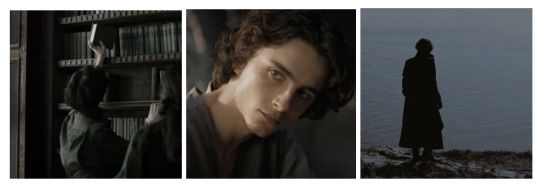
Summary: Regulus had always harbored a soft spot for a particular member of the Potter family. This individual stood in stark contrast to James, and being a Slytherin only seemed to fuel Regulus's obsession with the sibling who exuded a delicate scent of orchids.
P.S : English isn't my first language, so I apologize for any minor grammar errors. Enjoy!
Regulus had no intention in falling in love. Or was it all in his head?
God forbid he would need an excuse to glance in your direction or steal a look every now and then. The young man wasn't about to let you slip out of his sight so effortlessly. First, he had to admire every inch of your body, from head to toe. You were now his target, his prey.
He was well aware that this endeavor wouldn't be a simple one, especially considering you were the notorious sibling of James Potter himself.
Understanding your brother's protective nature, being associated with the Potter name wasn't exactly favorable, particularly from an ethical standpoint. Being a Slytherin only intensified matters, as it made you a target for Dark Wizards, much to James' dismay. For Regulus, this meant that even initiating a conversation with you posed a significant challenge.
Regulus remembered the very first time he had met you. Like every love cliché stories, it was during your first day at Hogwarts when your brother had been the light of everyone interest and Regulus had the chance to see your beautiful face exit the train and your hair seemingly blending itself with the wind. It was in that very moment that Regulus knew what falling in love was like.
Being a Black meant enduring Sirius's teasing at his whim, and with his family's significant legacy, observing his close rapport with the Potters, one might have considered themselves fortunate to easily encounter you during Potions class. You were slightly smaller than your brother, inviting mockery from him and his friends when reaching for higher objects, coupled with a persistent plea until the class's final moments. However, one time, Regulus seized the opportunity to intercept them before you. It was also the moment when both of you heard each other's voices. Your small “Thank you” and the smile you bestowed upon him were enough to stir butterflies in his stomach, followed by inevitable teasing from Sirius later that evening, as it became evident that your brother's attention was on the two of you.
After the initial encounter between Regulus and you in Potions class, James couldn't help but notice you two’s interactions. To his surprise, he found himself growing increasingly concerned as rumors circulated about Regulus's association with the Death Eaters, and perhaps even darker affiliations. As your brother, naturally, he wanted the best for you, but witnessing the potential dangers of Slytherin influence, it pained him to imagine you being ensnared by such influences. Little did he know, he was mistaken from the outset.
Regulus was undeniably a good person, a fact known to everyone. Yet, there was something about him that intrigued you even more. You couldn't help but notice from the outset the subtle glances he stole in your direction during class. Your friends occasionally teased about someone showing interest in you, but you couldn't bring yourself to believe it, especially with your brother's constant reminders about keeping your distance from men, especially Slytherins like Regulus. Despite all this, Regulus was keenly aware that you were conscious of his attention towards you.
Despite your efforts to maintain complete innocence regarding your brother's request, you couldn't deny the temptation or the inevitable encounter with Regulus. Which meant, he couldn't resist drawing your full attention to him, resorting to leaving notes in specific places where you frequented. With his signature R.A.B.
As a result, you couldn't help but become somewhat frantic, eager to uncover the identity of your secret admirer. This lead to an interesting investigation between the two of you.
This though first was brought up during lunch at the Dinning Hall. While he was away in his book, he couldn’t help but to notice and hear clearly his name being whispered from your own mouth. From this very moment, he couldn’t stop but to think— think about the endless dreams longing to hear your voice murmuring his name, begging to hear it, before it vanishes in echoes completely. How he would hold your hand seemingly, wondering off away from Hogsmeade to deep in the forbidden forest to admire the beautiful beasts you long wanted to discover amidst admitting it during class one time. Something he had not forget and it was these little details Regulus made sure of when the possibility of a real encounter.
The encounter unfolded within the confines of the Library. As you embarked on your quest to locate a book recommended by your teacher, one that aligned with your fascination for magical beasts, fortune smiled upon you as remnants of the coveted tome remained available. Despite its widespread popularity for research purposes. Your satisfaction was tinged with frustration as the book eluded your grasp, just beyond your reach. Regulus, perhaps guided by destiny, seized the opportunity to intersect your paths. As he reached for the book he sought, a familiar fragrance enveloping him—the scent of fresh orchids that had captivated him since your initial meeting. “Perhaps a little assistance is in order.” He remarked, his voice resonating with familiarity, reminiscent of your encounters in Potion class.
However, on this occasion, instead of flashing your customary smile, your eyes widened in surprise at the unexpected presence of the boy who might be your clandestine paramour. Despite the initial shock, you swiftly pushed aside such thoughts and donned your smile. Yet, your cheeks betrayed a different sentiment, flushing with warmth at the tender touch of his cold yet inviting fingers intertwining with yours. It had been an eternity since you had been in such close proximity to Regulus. Despite your inner turmoil and unspoken desires, you couldn't deny the longing for his company, and the warmth of his attentiveness towards you.
“Thank you…” Your voice, gentle and familiar, whispered to his ear, betraying your unmistakable affection for him. Regulus returned your smile with confidence, yet beneath the facade, a sly smirk danced across his lips as he handed you the book, placing it securely in your grasp. With a casual glance at the title, he feigned surprise, though inwardly he had anticipated your newfound research interest. “A fan of magical beasts as well?” He inquired, his tone softened, a deliberate effort to win the approval of your brother, something he knew he must secure to further his intentions.
“Yes.” You affirmed, though the realization of once again finding yourselves drawn together in such close quarters was a surprise even to you. Despite the shared space, your presence seemed merely a distraction to him, your brother's attention firmly fixed on Lily Evans. Nonetheless, Regulus seized every chance to revel in the pleasure of your company, carving out moments for just the two of you. The burgeoning attraction between you was becoming increasingly apparent. “Looks like we always meet in times when I am deed.” You confessed, acknowledging the truth of your words, yet Regulus finding this statement to be nearly impossible to resist the allure of such intense desire, passion. And intimacy with a man who embodied all these qualities.
As tempted as you were to acknowledge those thoughts, and even to acknowledge Regulus's correctness, you merely shrugged with feigned innocence. It was a quality that had captivated Regulus from the moment he first laid eyes on you. He longed to possess you entirely, to the extent that he would endure your brother's fury or the sight of the Potter girl tangled in Slytherin affairs. Regardless, his sole focus was to ensure that you belonged to him and him alone.
And much to his liking, James being in the same room just a few tables from afar your study had take knowledge of Regulus’s presence. How his thumb would be casually caressing your chin and lifting up slightly to have a the opportunity to feel his lips against yours. Just this once, and perhaps even more.
“You know…” His voice deepened, his warm breath grazing against your skin. In that moment, you realized you had been momentarily blinded by his actions, yet a stirring within you suggested that perhaps, like him, you were in love. In love with a man who sought justice and, undoubtedly, someone to cherish—a person with whom he could find solace and belonging. Regardless of your brother's approval, he remained unconcerned. “A little bird informed me that you've been receiving letters from a secret admirer. I couldn't help but be curious about their identity.” He confessed, his tone betraying a mix of intrigue and oblivious.
His voice, smooth as butter, dripped with both passion and curiosity, eager to uncover whether you knew the identity behind the mysterious letters. Despite harboring your own suspicions, you simply shrugged, a casual yet teasing smile playing on your lips. As he reciprocated with a gentle touch, his thumb grazing your chin, you sensed the tension radiating from your brother, torn between throwing a punch or holding back. Simultaneously, you were aware of your brother's intense gaze fixed upon you, even though your back was turned to him. In that moment, it was clear that he faced a choice: intervene or allow Regulus to kiss you.
“Don't,” Sirius mouthed the words silently, fully aware of Regulus's capabilities. If there was one thing he couldn't deny about his family’s qualities, it was the sincerity of Regulus’s feelings and intentions, especially when it came to the person he loved. Despite the complex dynamics between the Blacks and the Potters, whether as friends or foes, James couldn't bear to witness his sibling's sadness and envy once more. And so, with a resigned sigh, he chose to let it be. “Fine, but if he dares to break her heart. I won’t hesitate.”
As Regulus observed your eyes flickering from his gaze to his lips, he sensed a spark igniting between you. The way he spoke to you, the words conveyed on paper—it all pointed to one undeniable truth: your secret lover was none other than Regulus himself. A delicate smile accompanied by a soft chuckle escaped your lips, leaving Regulus slightly bewildered, prompting him to tilt his head in curiosity. “Though I may want to play the part of the suspicious and oblivious recipient of secret admirer letters, I believe I've unraveled the mystery.” You confessed with a hint of amusement.
Your confession alone was convincing, but it was Regulus's sigh that truly affirmed the man standing before you. He was undeniably your secret lover, unafraid to show his affection openly, even in the presence of your own brother. Regardless of family legacy or expectations, he cared not. As he drew near, the library eerily empty, his eyes never straying from yours, you felt the gentle brush of his lips before they melded into a long-awaited kiss—a kiss you both had yearned for, dreamed of, and finally shared.
Before you could even catch your breath, your fingers tenderly cupped his face, softly stroking his cheeks as he savored every moment of affection, his eyelids drifting shut. Then, your voice, sweet and longing, broke the silence. “Kiss me. Forever.”
Without hesitation, Regulus complied, pressing his lips to yours once again, unwilling to pull away until he sensed your brother's disdainful gaze. From that day forward, you became Regulus's other half, bound together by love and defiance.
#harry potter x reader#regulus black x reader#james potter x reader#mauraders#mauraders x reader#mauraders imagines#sirius black#sirius black x reader#regulus black x you#regulus black smut#regulus black imagine#thimothee chalamet#thimothee chalamet x reader#harry potter fanfiction#harry potter imagines#hogwarts x reader#imagines#mauraders x you#thimothee chalamet imagines
2K notes
·
View notes
Note
Sorry if you’ve already answered this, I’m having trouble finding different posts in your blog.
I know a lot of your asks are more practical-related, but how do you suggest fully encapsulating the horror and tragedy of war in a (fantasy) battle scene? I really need that emotional and gory impact but it also to seem reasonably realistic.
My favourite references are Battle of the Bastards in GoT and scenes from Lord of the Rings.
Thanks!!
Martin and Tolkien are not two authors I’d ever expect to find together when discussing thematic and abstract concepts like the horrors of war in their writing. One of them is extremely deep, and the other is a puddle. Neither of them are particularly “realistic” but only one of them claims that pretense while drawing from real history. If you’re wanting horrors of war, you’re much better off moving away from Martin and taking a gander at the actual War of the Roses.
Let me explain.
Tolkien served as an officer during World War I. By sheer body count, The Great War was one of the most bloody and brutal wars in human history. As a point of reference, over a million soldiers died during the Battle of Somme. Perhaps as importantly, World War I killed the cultural concept of the Summer War. Before World War I, the British upper class viewed war as a game. War was an adventure, something young men did between reaching manhood and getting married. Watson from Sherlock Holmes is an excellent example of the end result for this particular outlook. They figured they’d go off, have some jolly good fun, get a few scars, and be back in a few weeks in time for tea. What they got was a meat grinder. Two of Tolkien’s close friends died during the war. He also lived through the bombings during World War II while working as a professor at Oxford, he experienced the devastating effects that war had on the civilian population first hand, and, likely, saw a few of his students die. Despite his hatred of allegory, the man was working through some shit in The Lord of the Rings.
If you’re interested in learning more about World War I or even about effectively demonstrating the horrors of war, I do recommend reading All Quiet on the Western Front. I read it once in high school (more years ago than I’d like to admit here) and, much like Elie Wiesel, it has stuck with me. It was also such an effective anti-war novel the Nazis banned it and it was one of the first books they publicly burnt, so you know it’s good.
Back to Tolkien.
What they don’t tell you about fantasy is that it’s real life, just with elves and dwarves and magic. The real world forms the foundation of fantasy and it’s the humanity of the emotional experience in war, the good and the bad, with both ends cranked all the way to eleven that really makes Tolkien’s work so impactful. LOTR is operatic by design, but what keeps the narrative from falling into melodrama is the core thematic message underneath the pageantry. One of the major themes is hope, which gets symbolized in light, and hope’s interplay with despair, symbolized in darkness. Not just a rosy view of it either, but the genuine struggle to keep the light burning against all the overwhelming reasons to give up or give in. Tolkien allows his characters to be corrupted and redeemed, their struggle with temptation before ultimately choosing the better path or failing and falling into darkness. He commits to the idea that hope can be restored in the unlikeliest of places.
Boromir’s death is, perhaps, one of the best examples of Tolkien’s philosophy in action. Boromir is a character we’re not sure of, he wants the one ring from the outset, he’s the only one advocating that it shouldn’t be destroyed. The hearts of men are easily corrupted. When he tries to take the ring from Frodo, he falls into his worst instincts and breaks the Fellowship. But then, against the overwhelming flood of Uruk-hai, Boromir tries to save Merry and Pippin. He fights wounded, shot again, and again, until he’s felled by twenty arrows and he fails. Yet, in his failure he restores Aragorn’s hope in his people, gives him a reason to fight for Gondor, and inspires the audience to believe in Man’s potential for greatness.
Tolkien could have left Boromir in the dark, but he didn’t. He could’ve given into cynicism, but he didn’t. In every adaptation, Boromir’s death never fails to get me bawling. Boromir is both good and bad, both dark and light, his best and worst instincts are driven by the same underlying, sympathetic reason—his desire to save his people and fulfill his duty to his father.
On the whole, I find Tolkien’s presentation of the human condition and war to be more compelling and realistic than Martin’s. Tolkien’s underlying themes have more in common with All Quiet on the Western Front, Saving Private Ryan, and HBO’s Band of Brothers. For all that his characters often feel larger than life (by design, he’s telling an epic) there’s always a grounding quality that allows the audience to connect with them. Whether we agree with Tolkien’s core thematic message or not, Tolkien genuinely has something to say about warfare and its effect, both on personal and world changing levels, and he communicates that message very well.
The irony about the “horrors of war” isn’t about the horrors of war. Thematically, the “horrors of war” is about who we choose to become in the face of them when trapped in the crucible. Do we rise to our best selves? Do we fall to our worst? When every illusion about who we believe we are is stripped away, what’s left? It’s an existential question, not a “realistic” one.
You can’t write about the horrors of war in fiction if you have nothing to say about war, humanity, and its effects. All you’ll end up with is gore for shock value. The world becomes hopelessly depressing, and, in the end, all the blood turns brown before it’s finally shat out.
Hi, Martin.
Don’t get me wrong, Martin is a very skilled writer. His prose is genuinely beautiful and his first book in ASOF, A Game of Thrones is actually a pretty decent deconstruction in the traditional fantasy narrative and a fairly realistic treatment of how events would go for the standard well-meaning fantasy protagonist. And that’s… the deepest we get.
Martin comes out of the 24/Joss Whedon death for shock value school of writing and the land of Iron Age comics that doesn’t have anything to really say beyond, “people suck.” Underneath it all is a level of cynicism in the human condition that would make Garth Ennis blush. The deaths are just shock value. There’s nothing more to it than that. Once you’ve acclimated to the gore, there’s nowhere else to go and nothing else to think about. Ironically, out of his contemporaries, Robert Jordan is better at giving both war and death in his narrative lasting effect, driving character growth, and real meaning.
Martin and Tolkien are opposite ends of the spectrum in their approach to war and their outlooks are utterly incompatible. One of them is a complete cynic and the other is facing himself honestly, openly, fearlessly, and without a smidgen of irony. (The true irony here is that the latter is the Englishman.) Following Martin’s blueprint won’t bring you to a Tolkien outcome. Tolkien’s genuine emotion is the subject of mockery in Martin’s world. Season 8 may’ve been clumsy and infuriating, but it was the natural end of Comic Book Iron Age cynicism. There are no good people, people with power can never be trusted, and all heroes, no matter how noble, reveal their true colors as villains in the end. As Christopher Nolan said, “You either die a hero or live long enough to become a villain.” This philosophical outlook may be sold as realistic but it’s really just Political Both Sidesism, Fantasy Edition.
The irony is that the real history Martin draws from, The War of the Roses, is simultaneously crueler, kinder, more noble, more horrific, more impactful, and ultimately more hopeful than Martin’s own work. And this was post the Hundred Years War and all the wars that preceded it.
I bring you, the Duality of Man.
If you want to write a realistic battle scene, start with real war. If you want to write about the horrors of war, start with real war. Pick a war, any war, and dig in. Reading the experiences of others is a way to gain insight into experiences you yourself don’t share and start to process the different philosophies born out of those experiences. The horror of war is a human one.
The most important lesson is that you won’t get there by focusing on the battle itself. To truly feel the impact, every character needs to be carefully built from the very beginning with a through line to every horrific event that happens to them. If you want to learn how to do that, then you need to go study every single war movie from good to bad (including the jingoistic rah-rah ones) like Apocalypse Now, Saving Private Ryan, Battle for Iwo Jima, etc, to really start internalizing the underlying storytelling structure and character design formula that makes those films tick. There’s no one better at portraying the horror and humanity of war than the war film industry. Part of what makes the best of these films really good is their willingness to allow their characters to be emotional and vulnerable. Which you won’t find in a lot of fantasy novels that run on machismo, but is the secret sauce that gives Tolkien his impact.
Having the confidence to allow your characters to struggle, be vulnerable, experience humiliating circumstances, and appear weak is an aspect of writing that a lot of men and women struggle with. Cynicism is a form of self-protection to keep those emotions away, to keep one from being emotionally invested, and is a means by which we protect ourselves from being hurt. We may portray cynicism as the more realistic reality but it’s just a cloak we hide behind. Martin’s approach to warfare is less realistic than Tolkien’s. Tolkien’s characters approach warfare with an eye toward protecting their civilians, safeguarding their future, or, in the case of his villains, focus on genocide. War for Tolkien is the eradication of civilization and the destruction of the future. Characters from experienced combatants to innocent civilians are willing to risk their lives for a world and for the people who matter to them. Martin has the Summer War. It’s there in the title, A Game of Thrones. An entertaining charade of musical chairs. And while all of his characters are chasing power, almost none of them have any sort of vision or goal for the future beyond the accumulation of more. In Martin’s world, the only way to truly win is not to play, but in the real world playing is the only way to create the world you want. Cynicism ends with no seats at the table and no means to change or save anything.
It’s funny because England during the War of the Roses had been in a state of near constant warfare for hundreds of years with their own domestic powers and France prior to the War of the Roses kicking off. The concept of a Summer War didn’t really exist for the medieval nobility. Much as we joke today about war being a game for medieval nobles due to their ransom protections, it really wasn’t. The peasantry was also much, much more dangerous en masse than they are in ASOF. They drove traveling monarchs to hide in monasteries plenty of times and, while that’s funny, it’s not actually a joke.
Now, picture Joffrey dragged off his horse in the middle of a riot and having his skull crushed by a local fishwife right before being trampled into a bloody, unrecognizable pulp by sharp hooves.
Or enjoying the Agincourt bathing route.
You’re welcome.
-Michi
This blog is supported through Patreon. Patrons get early access to new posts, and direct access to us through Discord. If you’d like to support us, please consider becoming a Patron.
1K notes
·
View notes
Text
Am I handling the black woman character’s murder well?
@selfdxd2 asked:
Hello! My current project is a crime fiction set in KY, USA in which the instigating action is the death of a young black woman (W), with the first half being another young woman (L) investigating her disappearance and how it correlates with the disappearance of her close friend. That friend (P) is later found alive after having been kidnapped because he witnessed the crime, and is the POV character of the second half. He is also a white man, and him being white is relevant to other aspects of the story. My intention is for the "credit" for solving W's death to go almost entirely to L (who is also a woman of color, specifically Romani), and for the tragedy to be centered around the unfair loss of life and the pain of her parents and others who knew W rather than how bad P feels about it.
My main cast also has two other prominent black women with arcs that extend outside this tragedy. All of this is intended to lend to one of the story's major themes of social invisibility vs visibility. So does this exploration of that stray into harmful territory from the outset? I know successfully keeping away from any white manpain traps will take active caution while actually writing the story and I intend to get sensitivity readers as I work on it, but I wanted to get some feedback on my starting point before going too far down that road. Thanks so much for all you do!
It is important for us to know why this young Black woman was murdered to give specific advice.
Was it racially motivated, gender motivated, or both?
Wrong place, wrong time?
Did someone take revenge?
Was she involved in something insidious?
Was it truly an accident?
Depending on the reason, you should explore and acknowledge this violence and the existing societal problem behind it. For help, see the crime stats on violence against Black women.
…and for the tragedy to be centered around the unfair loss of life and the pain of her parents and others who knew W rather than how bad P feels about it.
Yes, give a voice to the people most affected by her death. Other Black women, people, and Women of Color. This will help further not make it about the feelings of a white man. He is absolutely a victim of the crime too, being kidnapped, so his trauma does matter and should be tended to. But ultimately, he gets to live.
On that note, his life being worth kidnapping vs. ending begs the question; why wasn’t he murdered while the Black woman’s life had to end? And for representation purposes, why couldn’t it be the other way around (Where the Black woman lives and witnesses the crime, and the white man dies)?
This is why knowing your reasoning for her death is so important.
Otherwise, if she was thoughtlessly murdered, it does feel like her life was incredibly devalued in your story due to her being a Black woman. It’s a serious and true problem, so I'm not saying not to write this. This just needs careful exploring. If you’re choosing to bring this real life problem into your story, it deserves full and respectful acknowledgement.
Please check out our resources on writing tragic material, Black suffering and abuse and avoiding exploitation.
More reading: tragedy exploitation tag
~Mod Colette
195 notes
·
View notes
Text
The Claw, The Scrunchie and The Prayer Card: Part 2 (Timing)
A couple weeks ago, I posted a prediction on the significance of the hair claw, the scrunchie and the prayer card that appear in Carmy's apartment in season 3. In that analysis, I suggested that these items represent three particular characters on the show and Carmy's relationships with them (FYI: the hair claw = Natalie, the scrunchie = Sydney and the prayer card = Richie). We see the scrunchie and the prayer card together at the end of 3x09 Apologies, placed in the same spot in Carmy's apartment. The first and last time we see the hair claw however, is in 3x01 Tomorrow, the first episode of the season.
In their reblog of The Claw, The Scrunchie and The Prayer Card meta, @moodyeucalyptus queried why we didn't see the hair claw with the scrunchie and the prayer card at the end of 3x09. I had my suspicions about this, but it wasn't until recently that I think I've come to a clearer understanding about the separate presentations of these items in season 3 and what the timing of their appearances means, particularly for Carmy's relationship with Nat and with his birth family.
Natalie is haunting Carmy
Or rather, the Berzatto family is haunting Carmy. Let me explain.
We see the hair claw in Carmy's apartment in the first episode of season 3. I think its early appearance in the season is for two reasons:
The first is that the hair claw is a legerdemain, meant to look like a token of Claire's given its appearance in 3x01 in between scenes of Claire at home and at work. I think the purpose of this sleight of hand was to misdirect the viewer's attention to Carmy's love life from the outset and misleadingly establish it as the primary source of his mental anguish this season. As I've noted here, I don't think Claire is the main source of Carmy's anguish.
In fact, it seems pretty clear that Claire herself is a legerdemain: a stand in for Carmy's relationship with The Berzattos. This has been discussed in various places on Tumblr including in this fantastic post by @brokenwinebox contrasting shots of Donna/Donna with Carmy and Claire/Claire with Carmy, as well as in this *chefs kiss* comparison between shots of Claire and the Berzattos done by @currymanganese. I also had a theory where I posited that Claire is a reverse-engineered haunt, maintained by Carmy to keep his brother Mikey in his life, after the latter's death.
We also have this LA Times article in which The Bear's Andrew Wehde (cinematographer) and Joanna Calo (showrunner, executive producer, writer and director) say the following:

All of the above is to say that Claire and her relationship with Carmy seriously appear to be sleights of hand masking the truth of the main source of Carmy's anguish: his birth family.
Which brings us back to the hair claw, which, as I've said here, I believe belongs to Carmy's sister, Natalie Berzatto.
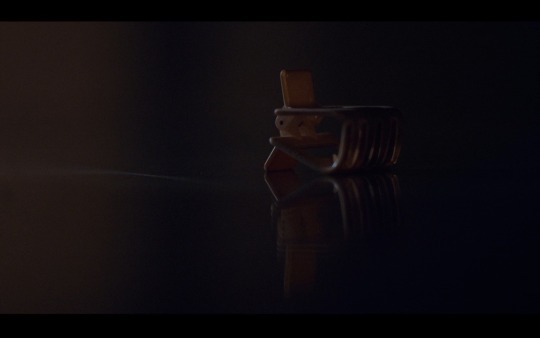
If we are working on the basis that the hair claw belongs to Carmy's sister and not Claire, lets get to the second reason that we see it in 3x01 and not with the scrunchie and prayer card in 3x09.
First, we need to note that Carmy's relationship with the owner of this hair claw - Natalie - is inextricably linked to his relationship with his birth family, the Berzattos. Natalie is his biological sister from that family and she's also the ONLY Berzatto family member that Carmy is seen having any contact with in the present after returning to Chicago to run The Beef in season 1.
Indeed, according to Jamie Lee Curtis, Carmy hasn't seen his mother Donna, the only other surviving member of his immediate family (that we've met on the show) since the events of 2x06 Fishes, approximately 5-6 years ago (given the events in season 3 appear to take place in 2023).
By the time we get to 3x01, Carmy's relationship with the Berzattos (including with Natalie) has had a lifetime of impact on him due, among other things, to an intergenerational history of abuse and trauma. Indeed, right before we see the hair claw in 3x01, we see Carmy staring down at the scar on his hand - a scar that @thoughtfulchaos773 has concluded Carmy got on the day he learned about his brother Mikey's suicide - another visual reminder of Carmy's family and the shadow it casts over his life.
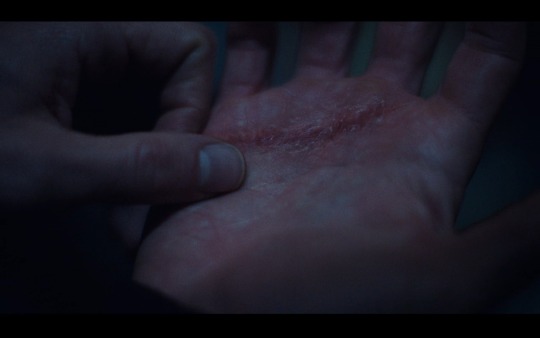
Given the above, I believe the hair claw in the season premiere indicates to us that Carmy is entering season 3 with this familial history playing heavily on his mind. Season 3 also starts on the back of the walk-in fiasco in 2x10 which this reblog thread between myself, @bbythurs and @ambeauty discusses as a representation for Carmy of a broken promise to Sydney and the rest of The Bear crew. In that broken promise, we see an inadvertent repetition by Carmy of the behaviours in his birth family that he hates the most (recall his Al-Anon monologue in 2x03 Sundae where Carmy says his family would fuck up things that gave him amusement and enjoyment, but specifically that they would make promises they weren't able to keep). In this way, season 3 starts with Carmy doing everything he can to undo that broken promise, to undo repeating hurtful familial patterns.
In contrast to the above, Carmy's relationships with Sydney and Richie, while not great at the start of season 3, have not yet reached a boiling point and perhaps are not as front of mind for Carmy. By the time we see the scrunchie and the prayer card at the end of 3x09 however, Syd and Richie's relationships with Carmy have massively deteriorated and are hanging on by a thread. They are definitely occupying his mind by then, explaining why the mementos associated with these two characters are revealed to us at that point in the show.
As always, these are my thoughts and an attempt to apply some logic to a season that, due to its lack of actual dialogue, relies on so much interpretation to muddle our way through. I'm not saying this as a total criticism, because my neurodivergent self loves analysing things like this, but I can see why this season put so many off lol. Its been 1.5 months since I did my first run through of this season and I'm still finding new things I missed during my first watch.
Tagging folks below who might be interested but as always, keen to hear from anyone that wants to chat about this stuff:
@currymanganese @vacationship @moodyeucalyptus @thoughtfulchaos773 @brokenwinebox @espumado @tvfantic87 @ambeauty @bbythurs @mitocamdria @turbulenthandholding @anxietycroissant @angelica4equity @devisrina @kdbleu
My next meta will get into just how The Berzatto family is haunting Carmy in season 3...when I finally get around to finishing it. I'm saying it out loud here to force myself to get it done lol. Stay tuned!
#the bear#the bear fx#the bear hulu#sydcarmy#sydney adamu#carmen berzatto#the bear meta#the bear season 3#natalie berzatto#anti claire bear#donna berzatto#mikey berzatto#richie jerimovich#the magic trick
70 notes
·
View notes
Text
okay but like the wind waker man. that intro. so many questions. we all know ocarina is dark but man wind waker just straight up said "and then they all drowned and the gods never came to help" hello??? how many years. how many decades. how much time did the adult hero of time buy for them? which child of zelda’s was daphnes? her son? grandchild? great-grandchild? when he stared at the rising waters and realized nothing was going to save them, his kingdom, did he think it was retribution for all the war?
has it really been all that long? yes and also no. the lines are so blurred. the zora are birds and the kokiri are koroks and they had time to Get That Way but everywhere you look the old Hyrule, the Hero of Time himself, they're both all over the place. the deku tree is implied to be the sprout from the adult timeline but honestly who knows. the golden goddesses are statues on islands somewhere and there was a tower built to test who came after but…who and how and why? what was the tower of the gods even for? how did they know they’d need it? at what point did they accept the hero of time was never coming back so they’d probably need to train a new one?
and oh my god, that outset island tradition. “dress your kids in green and give ‘em a sword and pray to the gods they’ll have the courage to cast down evil.” link rolls his eyes at it but he wears them to appease grandma. the revered clothes of the hero have had time to pass into “stupid traditional getup” territory. how many “failed Links” were there before Aryll’s brother? what evil could those children have possibly stricken down? the monsters in the woods?
“what became of that kingdom? none remain who know” like goddamn. say what you want about the hero’s shade in twilight princess. but at least the traumatized ghost got to meet one of his descendants and pass on his songs and his knowledge, even if that knowledge was only of war and death and combat. in the wind waker he’s a statue. an element of a legend mentioned once or twice by the last remaining holdouts of the past—holdouts who so badly want him to return, view him as the solution over all else, that they never pause to consider any other option. there are stained glass windows of the seven sages in the master sword’s chamber that are never mentioned. there is so much that is never mentioned.
nobody knows what the fuck anybody is talking about. link doesn’t know old hylian. tetra is running around the high seas (as a pirate. she and her retainers are now pirates. how did things get that way) with a piece of the damn triforce around her neck and she doesn’t know who ‘princess zelda’ even is. the juxtaposition between ganondorf, older and tired and wiser but still hell-bent on ruling hyrule even if it is a dead land full of nothing and no one, and tetra, a zelda that knows nothing, asking why he’s laughing and calling him insane. because hyrule’s dead. she has no frame of reference for his longing, or what he found so great about this sunken kingdom.
and this is framed as a good thing. the king of red lions thinks it’s better not to let either of the kids in on the loop until tetra nearly dies for lack of knowledge. daphnes nolhansen hyrule brought “the hero” back just to end ganon, and hyrule with him. was the plan always to let the sea fall in on him? maybe. i don’t know. but he rejects zelda’s plea with him to take him with them to the land that will be the new hyrule, because “it will not be hyrule. it will be your land” and that still gets me. he thinks the best thing to do with his kingdom, Hyrule, the kingdom of a whole hell of a lot of irl people’s childhoods, is for it to wash away. he wants the kids to live for the future and they do and they will and they name it hyrule anyway in his honor but he never gets to see it.
anyways i’m still mad everybody got butthurt over “trains in a zelda game” like come on now
#apparently i'm wind waker posting now#zelda thoughts#vaguely inspired by that tp post i saw where it was like “something terrible happened here”#wind waker is the most cheerful post-apocalypse i’ve ever seen#genuinely#because *nobody knows* what happened#a bit meta because wind waker was technically one of my first zelda games and i knew nothing about anything i just knew link was the hero#and then i l e a r n e d#i just really want daphnes and tp zelda to compare notes about their depression#the legend of zelda#lozww#wind waker#the wind waker#tloz#loz#spirit tracks#the legend of zelda the wind waker#triumph forks
382 notes
·
View notes
Text
“…In the Early Middle Ages, most French Jewish communities had settled in the southeast, on the shores of the Mediterranean. Although there were few Jews north of the Alps, they were the focus of restrictive laws that limited their freedom of movement and their ability to interact with Christians.
For instance, a mid-fifth-century council held in Troyes, northern France, prohibited Jews from going out of their houses to have any form of communication with Christians during Eastertide – a time celebrating the death and resurrection of Jesus Christ, therefore a particularly tense period for the Jewish community who were accused of his murder.
A century later, other councils banned the appointment of Jews to any public office that would put them in a position of superiority over a Christian. Jews were no longer allowed to work on Sundays and were to refrain from eating with Christians. Intermarriage between Jews and Christians was forbidden in early Roman law codes, a prohibition early medieval law codes reiterated.
At that time, the fragile state of Christianity – still a relatively new religion in Europe – fueled the clergy’s anxieties. Clergymen were afraid Jewish people would “pollute” the minds of Christians and turn them away from the Church. They advocated relentlessly for their conversion to Christianity. This project was finally successful in the seventh century when the Merovingian king Dagobert called for the baptism or expulsion of the Jews of his kingdom. More than a century of political unrest followed.
Dagobert’s rule, during which Jewish communities grew again in size. By the end of the year 800, Charlemagne became emperor. Charles’ attitude towards the Jews was ambivalent but more open than before. Carolingian capitularies reiterated certain older restrictions, and the chancery levied heavy taxes on the Jews. Because of these taxes, Jews constituted a reliable source of income for the chancery. Charlemagne, therefore, granted the Jewish communities privileges safeguarding their autonomy and their rights to practice their religion.
For instance, Jews responded to their own laws for all matters concerning “low justice,” such as marriage and business contracts, small offences, and inter-community disputes. Murders, however, were to be tried by the Christian authorities. Until the First Crusade, the lives of medieval French Jews were relatively peaceful – only two episodes of violence were reported in the early eleventh century. But things were about to change.
Set in the context of religious zeal, the Crusades stirred the pot of hate. Pope Urban II came to France in 1095 and preached the First Crusade with tremendous success. The message was clear: Christians should take up arms to fight the enemies of God and Christianity. While the pope clearly laid out that the point was to free Jerusalem, some interpreted it differently. According to chronicler Guibert of Nogent (1055–1124), a group of men from Rouen, Normandy, had decided to leave for the East, but they began questioning their purpose:
“We want to attack the enemies of God in the east after traveling great distances, while before our eyes are the Jews, of all races God’s greatest enemy.”
Pondering their options, the men took their weapons, captured many Jews, and killed them, adults and children alike, only sparing those who accepted conversion. Then they left for Jerusalem.
The Crusades fueled dozens and dozens of pogroms across Western Europe. In the late eleventh and early twelfth century, the pressure to convert was immense, and the risks of refusing to convert were even greater. A mid-twelfth-century Christian chronicler, Richard of Poitiers, acknowledged the great sufferings of the Jewish people at the outset of the early crusades, of which he underlined the unfairness. But the anti-Jewish sentiment in the Christian communities only grew stronger.
In the aftermath of the crusades, European Jews were at the center of rumours propelled by distrust and suspicion. In Blois, France, in 1171, Christians accused members of the Jewish community of having murdered Christian children during religious rituals. Called the “blood libel,” these accusations first appeared in England and were attested across Western Europe from the twelfth century to the modern era. In Blois, the blood libel accusations lead to the dramatic death of more than 30 members of the community. The survivors’ estates were confiscated. Ten years later, King Philippe Augustus expelled the Jews from the royal domain.
Anti-Semitism received the Church’s support in the early thirteenth century at the Fourth Lateran Council (1215). The council invited kings and rulers to force the Jews of their kingdoms to wear a distinctive symbol on their clothes or a specific hat that would make them immediately recognizable by Christians. In 1269, Louis IX of France made the symbols mandatory.
The thirteenth century also witnessed the forced segregation of Jews to specific areas. Traditionally, Jews lived together in neighbourhoods often nicknamed juiveries (Jewries). Paris counted four juiveries at that time. When Saint Louis made the distinctive symbols mandatory, he also forced the Jews to live in Jewries. Forced residence in Jewries signalled the birth of “ghettos,” neighbourhoods reserved for the Jewish population of a given town.
In the aftermath of the fourteenth-century plague, many Jewries were equipped with gates locked at night to prevent people from entering or exiting the district. Jewries started to turn into ghettos. The point of the ghettos, some rulers argued, was to protect the Jews from the violence Christians perpetrated against them. But ghettos also functioned as traps and participated in marginalizing the French Jewish communities.
The first decades of the fourteenth century were marked by an economic crisis and recurring food shortages. Anti-Semitism was on the rise again. In 1319 and 1321, Parisians – Christians – manifested their hatred toward Jews by publicly burning the Talmud. The plague signalled a new era of pogroms and violence against the Jews, who became the “scapegoats” of the crisis. The chronicler Jean de Venette witnessed and described the consequences of the plague for the Jews:
Some said that the pestilence was the result of infected air and water… and as a result of this idea, many began suddenly and passionately to accuse the Jews of infecting the wells, fouling the air, and generally being the source of the plague. Everyone rose up against them most cruelly. In Germany and elsewhere – wherever Jews lived – they were massacred and slaughtered by Christian crowds and many thousands were burned indiscriminately.
As Venette states, Christians accused the Jews of having poisoned wells to spread the disease. In Toulon, southern France, 40 Jews were killed by fire right after the epidemic started. In Strasbourg, northeastern France, in 1349, hundreds of Jews who lived in the city’s ghetto were locked up in a building by angry Christians and set on fire. Similar massacres happened in the pontifical city of Avignon, and in Narbonne, Carcassonne, and Toulouse, to cite but a few southern French examples.
Pope Clement VI (1291–1352) issued a bull forbidding the killing of Jews, but to no avail. Distrust and hatred were so intense that the city of Strasbourg, in the Rhine valley, expelled all Jews from its jurisdiction and forbade them from entering the city. This law was only removed from the city’s policies during the French Revolution in the late 1780s.
In many ways, medieval anti-Judaism paved the way for modern anti-Semitism. From accusations of greed and avarice to the blood libel, from the wearing of distinctive symbols to mandatory residence in ghettos, the Middle Ages witnessed the development of a series of stereotypes and a system of repression that had repercussions far into the twentieth century and the modern day.
But the Jewish communities of medieval France did not always live in fear. They enjoyed times of peace and independence and were, usually, relatively integrated into urban communities. Their role in the intellectual renaissance of the twelfth century is especially remarkable and well-marked in historiography.”
- Lucie Laumonier, “Hostility Against the Jews in Medieval France”
279 notes
·
View notes
Text
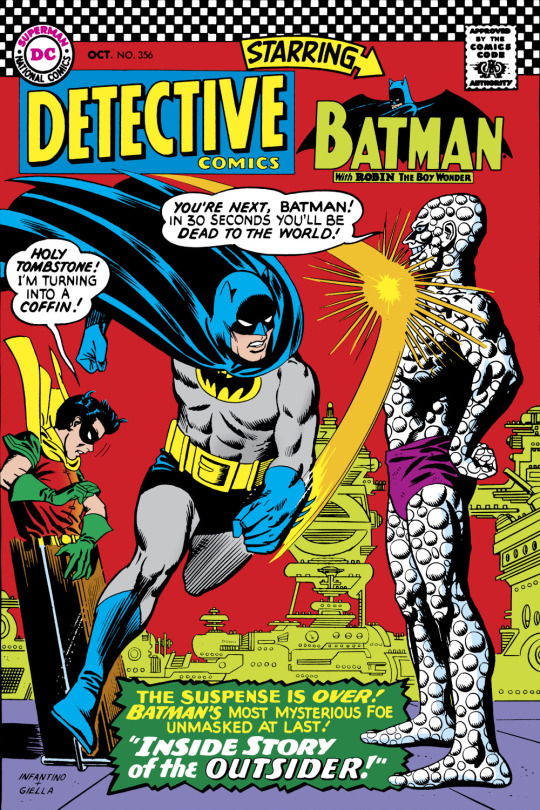
October 1966. You can't keep a dead butler down. About two years after killing off Alfred the butler in 1964, editor Julius Schwartz was faced with a problem: William Dozier, the producer of the forthcoming Batman TV show, wanted to include Alfred in the show, and wanted him reintroduced into the comics as well! Schwartz and writer Gardner Fox struggled with this challenge and finally came up with the utterly preposterous story presented in the issue above.
Even for a Silver Age Gardner Fox comic book, this story is exceptionally convoluted, so it's best considered chronologically. We begin with a flashback sequence involving iconoclastic "all-around scientific genius" Brandon "Plot Device" Crawford:
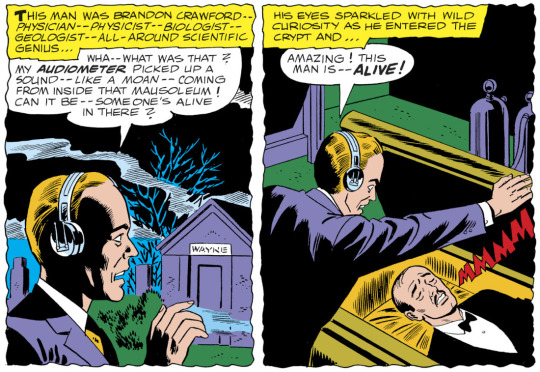
This is already straining credulity a little because the story in DETECTIVE COMICS #328 in which Alfred died (helpfully recapped elsewhere in this issue) showed that he had been crushed to death by a giant boulder. That did not seem survivable at all, and even if it were, this would imply that neither Batman and Robin nor whatever doctor who filled out Alfred's death certificate nor the mortician noticed that he wasn't actually dead! Anyway …
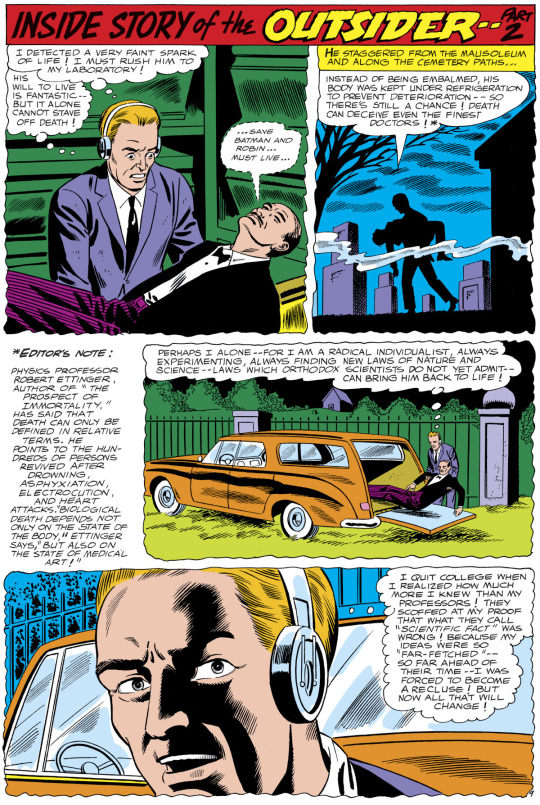
So, Alfred wasn't actually dead, he wasn't embalmed, and he was buried in a refrigerated coffin (that's what the purple cylinders in the last panel previous page were for). A stretch, but we'll allow it. However, upon discovering this, Crawford, instead of calling an ambulance like a normal person, seizes on the opportunity to do some Frankenstein shit with Alfred's maimed, broken, mostly dead body, as one does (if one is a reclusive "radical individualist" who dropped out of college to pursue unorthodox, dubiously ethical scientific experiments, I guess).
One of the initial objects of Schwartz's tenure had been to rid the Batman books of the fantastical aliens, monsters, and bizarre transformations of the 1957–1963 period in favor of something a little more grounded. All that goes out the window here, despite the rather defensive editorial footnote, which says:
EDITOR'S NOTE: Physics professor Robert Ettinger, author of "The Prospect of Immortality," has said that death can only be defined in relative terms. He points to the hundreds of persons revived after drowning, asphyxiation, electrocution, and heart attack. "Biological death depends not only on the state of the body," Ettinger says, "but also on the state of medical art!"
Okay, then. On to the Frankenstein shit:
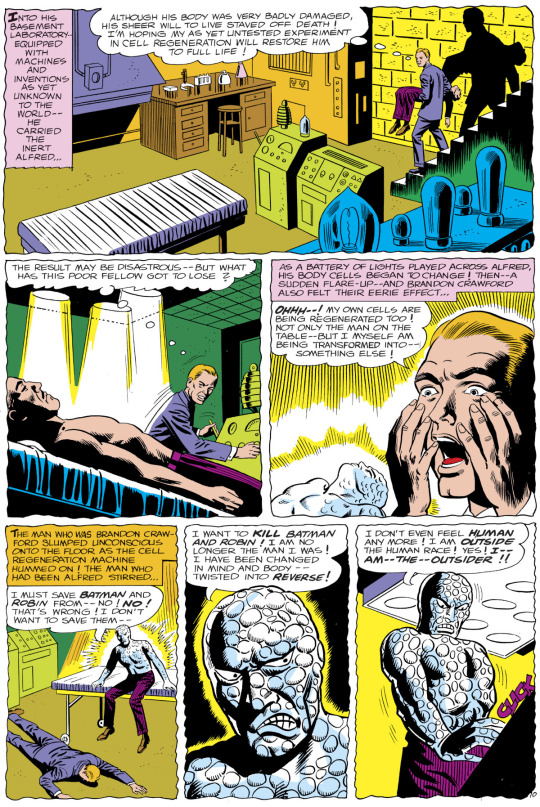
So, Crawford's experimental cell regeneration machine has restored Alfred's broken body, but in the process transformed him into an unrecognizable, rather hideous-looking being who is also evil. Check! The regeneration effect we see Crawford panicking about then transforms him so that he looks like Alfred, while leaving him in "a catatonic trance." The Outsider, rather ungratefully, puts Crawford's unconscious body back in Alfred's coffin to cover his tracks, and uses Crawford's various machines and his own "increased mental power" in his new quest to destroy Batman and Robin.
This was not the first appearance of the Outsider, who had actually been hounding the Dynamic Duo on and off since DETECTIVE COMICS #334 two years earlier, although he had never appeared on-panel, and his identity had been a mystery. Where Schwartz originally intended to take that plotline is not clear (Schwartz's own account doesn't say, and Gardner Fox said later that he didn't think Schwartz had a solution in mind at the outset), but it doesn't seem likely that revealing the Outsider as Alfred was the plan, particularly since subsequent Outsider stories had shown that the villain had superhuman powers, including the ability to bring inanimate objects to life! In this story, the Outsider really does transform Robin into a wooden coffin, as the cover indicates — it's not a hypnotic illusion or some other such dodge. Fortunately, the effect is reversed after the villain is defeated:

Batman's determination to keep these events secret from Alfred is bizarre, since Alfred's death is a matter of public record: As seen in DETECTIVE COMICS #328, Bruce Wayne started a charitable foundation in Alfred's name, with its own building in Gotham City! Batman suggests that they can rename the charity the Wayne Foundation (as of course they subsequently did), but how he expects to resolve the various problems created by Alfred having been legally dead for months without his finding out is unclear. They do take the time to retrieve Crawford (who has miraculously not suffocated or starved to death in Alfred's coffin) and use his machine to return him to normal, after which Batman suggests that Bruce Wayne will give Crawford a job at the renamed foundation.
If you're wondering, "Wait, does this mean Alfred now had super-powers?" the answer is yes! Since he didn't retain any conscious memory of his death and resurrection, he was normally unaware of this, but Alfred's evil Outsider personality resurfaced several times, and he sometimes spontaneously reverted to the Outsider's form, in which he once again had supernatural abilities:
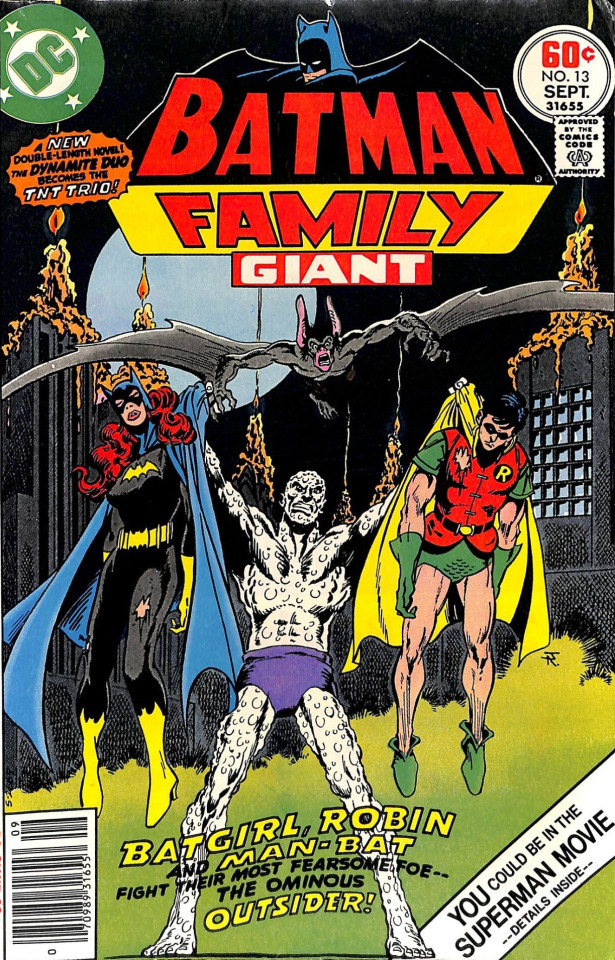
Notice the background, with the buildings burning like candles? The Outsider did that with his mental powers, along with a bunch of less grandiose but equally impossible feats. Fortunately, they reverted to normal after he split into separate good (Alfred) and evil (Outsider) selves and defeated himself. The Outsider resurfaced once more in 1985, battling the Outsiders and nearly killing Superman by transforming the Batcave's giant penny into Green Kryptonite.
I guess this whole saga did resolve the problem of resurrecting Alfred for the TV show, but in what I think can fairly be called the most ludicrous way possible. (And you thought the PENNYWORTH show spun out of GOTHAM was silly …)
#comics#detective comics#gardner fox#sheldon moldoff#joe giella#julius schwartz#carmine infantino#alfred pennyworth#batman#bruce wayne#robin#robin the boy wonder#dick grayson#batman 66#batman family#jim aparo#i love that crawford has this whole frankenstein scheme#including his little speech about the world not appreciating his genius#and it's a complete throwaway#he's not even a supervillain he's just some guy#the pennyworth show actually isn't that ludicrous at the outset#but it takes a sharp detour into crazytown as the second season progresses
133 notes
·
View notes
Text
S1E5 – The Doomsday Option Write Up P2 - Saturday (The last day of the World) from "the wiggle on" to "He was waving"

Alright, so now we have the seed of hope planted for an Aziraphale/Crowly reunion, this episode moves, pretty swiftly, through a number of plot threads that now all need to be brought together to serve as the climax for the season.
Thread number one: Madame Tracy and Shadwell, and their purpose in the storyline.
I don’t have a great deal to say about this scene, only one tiny question. Why is that Julia makes no move to hand over a “donation” to Madame Tracy?

Both Mrs. Ormerod and Mr. Scroggie (brilliant names by the way) are clearly well-prepared to be handing their money over, but not so young Julia. I don’t think it’s important, just one of those little things I wondered about when I was watching the scene back.
Thread number two: bringing the Four Horsemen together.
Couple of things to point out in the next montage sequence, including an Easter egg or two. Firstly, the immigration official has clearly become disillusioned with her job in the short time that she granted Anathema into the country.

It’s a very different interaction than the one she had with Anathema where she was actually paying attention. Even Famine seems puzzled at her lack of interest. Next up I just want to say that I really didn’t have the Four Horsemen of the Apocalypse down for being tea-drinkers. Don’t get me wrong, I’m British. Tea is the foundation of civilised society as far as I’m concerned. But that’s kind of the point, isn’t it? These four characters are about to, quite happily, undo all of civilisation. Always time for a cup of tea I suppose though. And now for an Easter egg! Feels like it’s been a minute since I’ve pointed one of those out. The top scores on the arcade game next to the one that Death is playing on are all allocated to D.EATH, except for the #1 spot, which goes to T. PRATCHETT.

There is another Easter egg here for the eagle-eyed, this one of the apple variety – one of the questions on the quiz machine asks what year Apple Computers was founded in.

And the last thing about the quiz machine: the machine that displays the “GAME OVER” sign is actually not the machine that Death has been playing on:

As a little side note, once we realise that it’s Death playing on the quiz machine, we can appreciate that he has in fact been there from the beginning of the scene. I wouldn’t swear to it given the camera angles that are used, but I don’t think his bike is in the car park when War arrives. You could argue that it’s out of shot, but I’m still pretty sure she would have recognised it for what it was and known that he was already inside. Famine and Pollution too. So why aren’t they aware of his presence from the outset? Again, probably not important, and the little quiz machine interaction provides some much-needed light comedy.
Back to thread number one. I found little of interest in this scene prior to Aziraphale’s arrival from the spirit world, aside from the vapid personality of Mrs. Ormerod and the obvious dig at the validity of psychic mediums whilst using the delightfully oblivious Mr. Scroggie. What I do really enjoy about this scene is the sound editing (I know, you’re all shocked I’m picking up on sound cues…). We know that something is about to happen when a low rumble begins, enforced by some lightly flickering candles in a room with no breeze, but the real joy here is the sequence of noises, animal, human, and object, that issues from Madame Tracy’s mouth as Aziraphale takes up residence in her body. Miranda Richardson does a pretty stella job here too – this was either really fun to shoot or incredibly embarrassing. I’d lean towards the former, given she’s largely a comic actress, but managing to keep a straight face throughout the whole thing must have taken an incredible degree of self-control. I’d be quite interested to know how much free reign she was given with this, how much of it was improvised, and if she knew there was going to be extra noises added in post-production. Here’s a list of the noises that I could pick up in the sequence that takes place during Aziraphale’s possession:
Rumbling noise before Madame Tracy starts vocalising.
Madame Tracy making a low rumbling noise.
Elephant trumpeting.
The noise of something ramping up, like a turbine engine but not. No idea what this noise actually is!
Thunder (from outside the house – accompanied by lightning).
Madame Tracy’s short shout followed by very high and musical almost-screams.
Another one of those weird ramping up noises but shorter and sharper.
Panting.
Madame Tracy blowing a raspberry.
Loud singing (enforced in the soundtrack) of the William Tell overture.
Madame Tracy belching.
A little quacking noise made by Madame Tracy.
A fart (no way was I leaving this off the list), which puts a definitive stop to any other noises that are ongoing.
Pretty impressive. Those sound editors aren’t done yet though, because aside from another chaotic sound sequence for Ron’s possession, there’s still a load of work to do with the voices coming out of Madame Tracy’s mouth. I love the way they shift between her voice and Aziraphale’s during the following sequence, starting from the very first sentence that she says after the possession has completed – she starts out as Madame Tracy and finishes as Aziraphale (in German, which we were led to believe that he couldn’t speak back in 1941). There are times in this scene where both voices come out of her mouth at the same time and there are other times where Madame Tracy speaks in her own voice but in a deeper tone, and times where it’s one or the other speaking, and it’s all so seamlessly stitched together. Not to mention the fact that it never once looks like it’s not Miranda Richardson speaking – her lip movements match the words exactly. She even adapts some of Aziraphale’s mannerisms when she’s speaking as him. It’s a really brilliantly put together scene. The sound sequences for Ron’s possession (played by none other than Johnny Vegas) are more difficult to pick out because the surrounding scene is very noisy (not that Shadwell would know anything about that, sound asleep in the unaffected boudoir) but I did manage to pick out:
Another raspberry.
A short squeal.
A line from “Moonlight Becomes You” (by Johnny Mathis, I couldn’t see any immediate Easter eggs or references from the lyrics).
A prolonged shout.
More thunder.
What sounds like a piano string or strings (from low down the keyboard) being struck.
A retching noise like someone’s about to hurl.
Something bubbling.
Howling.
Lightning.
Fireworks, used in the same way as the fart in the first sequence – to cut off all the other noises.
It feels like quite a jolt moving from all that cacophony into Madame Tracy’s peaceful kitchen. There’s one little thing that really makes me giggle in this scene:

She seems pretty blasé about the fact that there’s a blonde, slightly transparent, male figure staring back at her from the mirror. It’s only when he actually waves back at her that she reacts at all, and even then it’s pretty muted. I think most of us would have taken off screaming at that point, or pass out, but not Madame Tracy, she’s way too worldly-wise for that dramatic nonsense.

I was a little puzzled at the choice of soundtrack for Crowley’s battle against the traffic in the next scene, but then I wondered whether it was a reference to the M25 being another one of Crowley’s plans that started out so well and then ending up foundering “on the rocks on iniquity”, which appears to be a bit of a running theme throughout the show – first the misplacing of the Antichrist, again in his desperate pleas to Aziraphale for them to run away together, and in his failed rescue of the angel. This particular instance of Crowley’s well-intentioned failings would suggest that it’s a characteristic he has been prone to for a long while, and that the foundering of his plans can take anything from seconds to decades. And just for a bit of fun, a tried to get screenshots of the M25 before and after Crowley’s interference:

I also noticed that the projector Crowley uses is marked as belonging to Room 11:

Having fallen foul of my neglect in consulting Strong’s Concordance with numbers in my write ups before, I did actually remember to look this one up. According to my scant research, 11 in Strong’s Concordance represents a place of destruction or ruin. Whether this is a reference to Crowley’s original intentions for the M25, the eventual fate and purpose of the M25 in the show, or a tongue-in-cheek remark to the experience of actually driving on the M25 in real life isn’t clear. Maybe it’s a bit of all three. Or maybe it’s just a random number. Unlikely I think.
Now that Shadwell’s had a nice little snooze, he also seems to have had some sort of personality transplant. That’s the only real explanation for the impassioned attempt at protecting Madame Tracy’s dignity, right? I think we as the audience all know better, but he clearly forgets himself in the heat of his jealous moment. Interestingly, the mirror no longer appears to show Aziraphale’s reflection:

I think this might just have been a case of budgetary or time restraints rather than an intent to convey anything specific. Whatever the reason, Aziraphale doesn’t seem too upset at Shadwell for discorporating him. One question though – how does the angel know that Shadwell has referred to him as “the Southern pansy” before? As far as I can remember, he never uses that name to his face, which only really leaves the possibility that he has obtained the information from Madame Tracy, who has heard him refer to Aziraphale in that way at least once before. I find it unlikely she would have told the angel the offensive name that had been allocated to him, which suggests he has obtained the news from her own thoughts. Obviously at this point Madame Tracy is sharing the residence of her body, but it does raise an interesting question for later when Aziraphale and Crowley perform the body switch – would they be able to read the thoughts of the other without the sentience of that other being present concurrently?
Whilst we are on the topic of how people know things that they do, how does Crowley know the M25 has just combusted into a ring of infernal flames? I know we’ve had the whole “Crowley turned the M25 into a hellhole” scenario written out for us already, but that was to do with the eternal traffic jams he caused, not some sort of hidden boobie trap that would cause it to spontaneously combust. Presumably this is one of those things his demon-sense tells him has simply happened, like when Adam welcomed the Hellhound into his life.
I find the next scene with the cold caller provides an interesting overview of the way nuisance callers have evolved across the years. The basis for the call in the original book was double glazing, but we’ve moved on to ambulance chasers in the show. As a society I think it’s likely we’ve moved on even further now, from using actual real people to individually make these calls to automated recordings, but Hastur wouldn’t be able to eat them all in that case, thus denying the audience the satisfaction of the sick justice he unwittingly wreaks on the call centre staff. Got ourselves a little Easter egg here too – the message that Lisa types out on her screen (to a colleague or as a note on a casefile isn’t clear) is the title of a Queen song:

This happens to be the very song that Crowley was listening to in the Bentley on the M25. She also types that up right before she arrives his own casefile (titled “Anthony Cowwley”, which differs from the book’s “A J Cowlley”).
Shifting back to Crouch End now (this episode really does jump around a lot doesn’t it?!), can we just take a moment to gape at Aziraphale adamantly declaring that the Antichrist must be killed. The Antichrist who is a child. It really wasn’t that long ago that he was vehemently stating that he himself could never do such a thing, nor could he endorse it without suggesting that it would be for the good of Heaven’s reputation. Now though, he’s very happy to encourage a human, for whom the consequences of killing an innocent child would be dire in Heaven’s eyes, and even worse for killing the Antichrist as far as Hell is concerned, to do the deed, but this time the motivation is nothing to do with his employer; it revolves around the fate of the World. It feels like something of an oxymoron – his siding with humanity driving an incredibly inhumane act. In fairness, Shadwell follows it up with an oxymoron of his own:

So, as far as Shadwell’s concerned: witches? Kill without question. The Antichrist? Not so sure. Even if he’s going to bring about the end of the world. Sounds like he’s all good with the plan when Aziraphale tells him that he has traits associated with witches though. Good morals Shadwell, well done. Perhaps not quite as terrifying as Aziraphale’s declaration of triumph when the sergeant suggests they can use a massive antique gun to fire lumps of building materials to assassinate the Antichrist. Again I’ll point out that Adam is a child, but perhaps it wasn’t clear enough earlier on that Aziraphale also knows he’s a child.

I don’t know whether what I’m about to say describes a typically British behaviour when caught in traffic jams or not, but here goes. Anybody else find it suspect that other people aren’t either already driving down the hard shoulder or that Crowley doesn’t have a giant tail of cars following him? I’ve been in my fair share of motorway gridlocks, enough to know that once some entitled prick starts driving down the hard shoulder in attempt to assert their own self-importance over the rest of the people caught in the chaos, anybody else with delusions of grandeur will follow suit very quickly. Not for Crowley though, he’s just pottering down the escape lane under his own steam. And is it just me, or does it feel like a bit of a violation when Hastur removes Crowley’s glasses? Looks to me like Crowley feels like that as well to be fair.

He manages to get over his surprise quickly enough though, characteristically engaging his brain into full gear to try and find a solution, which he does with an interesting choice of music:

I find it interesting because it deviates from what we have come to believe is his usual taste in music. Mozart would actually seem to be more Aziraphale’s taste than Crowley’s. It’s also a pretty sedate underscore for what he’s about to do. As a side note, this piece not only doesn’t actually start from the beginning when it starts playing in the Bentley, but is also used in another one of my favourite shows – Our Flag Means Death. In that show, it’s used as background music in the final episode when Prince Ricky is strolling down the street his victory over the pirates with another naval officer. The Mozart doesn’t stick around for long though, morphing into Queen’s “I’m In Love With My Car” (no need to point out the reference with this one) as Hastur starts to lose his calm. For those who haven’t read the book, or just don’t remember this detail, there is mention of this phenomenon in the original text – the apparently common mystery that every tape or CD left in a car is doomed to become a Queen album eventually, but this little detail is left out in the show, with the audience instead being led to believe that the CD player plays mood-appropriate music instead.
The speech we get from Crowley here goes a long way to showing us how much he has come to love both humanity and modernity – he’s actually quite complimentary about humans and their ability to invent new things.
Lovely clever people, inventing cars and motorways and windscreen wipers.
He also, in a very dismissive way, puts a clear distinction between himself and Hastur with his marking of the difference between his feelings towards the 14th century and what he believes the Duke of Hell would have thought. That simple little line actually says a lot to me about how he believes he distanced himself from the other beings in Hell – it’s a clear declaration of “we are not the same”. I also find myself wondering if Crowley had little to no contact with Aziraphale during the 14th century, contributing to his dislike of the time period. We certainly never see anything of the sort – the meetings we bear witness to have a large gap between 537 and 1601, though the book and script book tells us that there was definitely a meeting in 1020, and the script would suggest that there were several (dozens of them in fact) meetings between that and the 1601 meeting.
It's interesting to hear that Hastur is concerned that he’s going to be discorporated as it confirms he’s been issued with a human body, just like Crowley, even though he doesn’t reside on Earth. I’d be interested to know if the body was issued to him in that state or whether it looks pretty run down because of Hastur’s lack of appropriate care (which would in turn suggest that both Aziraphale and Crowley have had to work towards maintaining the appearance of their own corporal beings). And whilst we’re on the subject of bodily appearances, I love the little detail that the snake component of Crowley’s eyes now fill his entire eyeball as he maniacally drives through the flames.

I have a suspicion that the size of the snake “irises” (for want of a better word) is reliant on his emotional state, but I don’t feel like I have the patience to go through the show and test the theory. And I don’t know if those little horizontal lines on Crowley’s nose were intentional here or whether that’s just a natural crease in David’s face, but they certainly strengthen the snake resemblance. As a final comment on this scene, we actually hear God telling us that Crowley really is fundamentally different from his peers – he has an imagination. Which is not so different from the idea that Aziraphale is different from his peers because he has free will, a theme that has been presenting itself, with increasing clarity, throughout the series.
Final little note for this section, and it’s about this snippet of epic:

Apparently the most amazing thing about this, according to the local bobby, isn’t the fact that the car is on fire, or that it’s just driven through a wall of fire, or that it’s still moving forward, or even that the person inside it is not only alive, but unharmed and still capable of driving. No, the most amazing thing is that the driver is waving. Gotta love the way us Brits have a way of stating simple facts to display complete amazement.
Right, this section went on for way longer than I thought it was going to so I’m going to cut it short. I was hoping to get as far as the defection of The Them from Adam, but as soon as I started watching that scene I realised I had more to say about it than I thought, so I’m going to let you go for now. As always, questions, comments, discussion – always welcome! See you next time 😊
#good omens#episode analysis#good omens season 1#ineffable idiots#aziracrow#aziraphale#crowley#madame tracy#sergeant shadwell#good omens death#good omens soundtrack#crowley's sunglasses#crowley's bentley#good omens music#good omens hastur
28 notes
·
View notes
Text
One Hell of a Love (Book 3) Chapter Twelve
Sebastian Michaelis x Demon! Reader
Chapter Twelve: One Hell of a Midnight
Summary: Sebastian and (Y/N) face Undertaker in battle once more.
“This school is a respected institution that has produced elites who form the mainstay of Great Britain. Our generation cannot afford to defile the tradition that has been protected for thousands of years since the founding of this school! For the history of Weston College is the history of England!” said Bluewer, desperate to prove that he, Redmond, Violet, and Greenhill had done the right thing.
Ciel narrowed his eyes before closing them as if exhausted the situation. “…Fine.”
Sebastian and (Y/N) glanced at Ciel.
“I was investigating this incident…under the orders of a certain distinguished personage. I can’t keep silent now that I’ve uncovered the truth,” said Ciel. “However, I shall request measures which will take your circumstances into account.”
(Y/N) raised a brow. They wouldn’t interfere with Ciel’s decision—what happened to the P4 was none of their concern—but they disagreed with giving lenience from the outset. If these four were so noble, they would take the punishment they were given. If the situation gave them a lesser punishment, then very well, but (Y/N) found no sympathy for them.
However, there were other issues with people (Y/N) did have some connection to—positive and negative—to handle which were much more pressing.
“Now, that just leaves you.” Ciel narrowed his eyes as his attention went back to Undertaker. “What are you after?!”
Undertaker smiled as he picked up a cupcake and leaned on his other hand. “You have bestowed upon me plenty of laughter so I will explain for old times’ sake.”
“It was only for a moment, but Derrick was conscious beyond a doubt,” said Ciel. “He was clearly different from the previous reanimated corpses. No! He has evolved!”
Undertaker munched on his cupcake. “It pleases me to hear that! Quite so. The dead can also advance by way of episodes.”
“Episodes?” Sebastian furrowed his brow. “Do you mean the counterfeit memories you have created? Connecting them to the Cinematic Records of the dead was how the corpses began moving.”
“Guess again.” Undertaker pouted and crossed his hands in an X. “You’re close, though. Those memories were gibberish. The current corpses are being moved by their longing for the future.”
“Humans recall their pasts in their final moments. That is their cinematic record. At the same time, they crave the future they were to have had although those futures are incomplete. The fragments of those futures comprise their episodes.”
(Y/N) narrowed their eyes. “I did not experience such longing.”
Undertaker grinned. “You took your death into your own hands and welcomed it with open hands. You threw away your future with a vengeance. Of course you experience no longing. You reveled in revenge.” He laughed. “And, as ever, you prove an interesting exception~ Quite the inspiration~.”
(Y/N)’s eyes flashed fuchsia at his continued focus on their mortal life. After he pushed them through their memories once more, they were fed up with it and itched to return the favor of pulling him away.
Sebastian’s eyes narrowed at the playfulness with which Undertaker directed his quips to (Y/N). He disliked the familiarity with which Undertaker addressed them. He had already said he reaped their soul originally, and Sebastian despised that degree of “closeness” Undertaker could claim with them—even if it was such a moment as death.
“But I digress.” Undertaker tilted his head and leaned on his hands. “What if those episodes could be extracted? What if several tens of thousands of cuts can be had? What if the total length of the linked episodes was longer than their Cinematic Records?
“It’s akin to a future forecast. They are memories of the future, nothing like my counterfeit memories. If I connect such a thing to the Cinematic Record—do you not agree that what will be perfected is a reanimated corpse infinitely approaching a living human?”
Undertaker grinned at the horrified expressions of the humans and the narrowed eyes of the (Y/N). “Weeeeeell, the probably of success is still very low as it is dependent on the quality and quantity of the episodes.” He shrugged. “I still can’t approximate other ways of returning to life.” He grinned at (Y/N). “Eh?”
“I have no shred of mortality. The person I was died in every way,” said (Y/N), speaking with an icy, sharp tone. “These experiments are your attempt to perfect what will always fail.” Whatever he was planning, whatever his end goal was, whatever experiments he was planning, (Y/N) didn’t like it. To mess with nature itself was to invite twisted magic. It would never end well; something would break, whether it be the experimenter or the experiments.
“Oh?” Undertaker grinned. “Perhaps for now. But I wish to look beyond the fated end.”
“Beyond the end?” said Ciel, furrowing his brow.
Undertaker flipped the top hat onto his head. “Has it ever occurred to you that something exceedingly amusing may unfold beyond the roll of the credits?”
Sebastian smirked and raised a brow. “I disagree with you on that point. ‘Death’ is an absolute end. That is why I find it—” his eyes turned fuchsia “—most beautiful.” He gazed at (Y/N). “What do you think? You are the one who experienced it.”
“To disturb the process of death would be to disturb nature,” said (Y/N). They narrowed their eyes. No one was quite understood how humans became demons as it was so rare, but they knew it wasn’t continued life so much as rebirth into something new. “And you invite your own ruin when you do so.” They had been a witch; they understood.
“How poetically put~” said Sebastian, smirking.
Undertaker tutted and stood. “This is all I can tell you with the compensation I have received. Well, then.” He grinned. “It would be a nuisance if certain bothersome individuals were to discover my whereabouts. So I shall be going now.”
“I won’t let you escape again!” shouted Ciel. “Capture him, Sebastian!”
“As you wish!” Sebastian ran forward.
The moment he lunged for Undertaker, Agares ran between them and grabbed Sebastian’s hands. His scholarly cap fell from his head, and (Y/N) saw the stitches—he, too, was reanimated.
“So, you too, were a corpse, Vice Headmaster Agares,” said Sebastian, narrowing his eyes. “That must be why I felt a sense of discomfort then.”
(Y/N) grabbed Agares and forced him back with Sebastian, but above them, Undertaker jumped onto the hedge wall.
“That one is replete with episodes and is my crowning masterpiece, for now,” said Undertaker.
(Y/N)’s nose twitched, and their eyes turned fuchsia. So Undertaker was planning more. What is he working towards?
Undertaker snapped his fingers, and human hands burst out of the ground. The humans let out a gasp and cry, and (Y/N) and Sebastian narrowed their eyes as the reanimated, simply bizarre dolls of Derrick’s friends dragged themselves out of the ground.
“These are Derrick’s accomplices!” said Ciel.
“Run!” Edward was instantly focused on survival after the attack on the Campania. “Leave this garden now! Hurry!” He supported Greenhill on his shoulders.
Ciel opened the garden door, and the prefects and drudges ran for escape. Harcourt was knocked down by one of the accomplices, who loomed over him.
“I-I can’t move!”
“Come on!” Ciel grabbed his arm and pulled him away.
Undertaker chuckled as he watched. “He may have inherited the Phantomhive blood, but he’s quite unlike his predecessors. Most, anyways.” He tilted his head in amusmenet. “Don’t you agree?”
(Y/N) and Sebastian narrowed their eyes; Undertaker’s connection to the Phantomhives was quite strange.
“What a riot this is!” said Undertaker.
“My, my, you are quite carefree about all this,” said Sebastian. “Do you believe you can stop us with something like this?”
“How dare you underestimate us like that,” said (Y/N), a cat-like grin flitting across their features.
Undertaker grinned. “I’ve never underestimated you. I know not to.” His eyes flicked to Sebastian. “All that sets us apart are our goals.” His eyes slid to (Y/N) and Ciel again.
Sebastian’s eyes widened as Undertaker smirked, and his entire body went into alarm mode. If he brought down Agares now and then sought to capture Undertaker, then Ciel would be left open to attack or (Y/N) would be, and after seeing (Y/N) bleeding in his arms, Sebastian would do anything to avoid that.
So as Undertaker looked at (Y/N) and Ciel, Sebastian’s desire to protect his contract and his love overtook his need to follow Ciel’s orders—Ciel’s life took precedence, and he could ignore the order (and, fortunately, protect (Y/N), too).
Sebastian bent backwards and slammed Agares’s head into the ground. His brain was crushed, and he stopped moving. (Y/N) shifting to jump towards Undertaker, but Sebastian’s heart thudded, and he grabbed (Y/N)’s waist.
“Wha—Corvus, let me get him!” hissed (Y/N).
“No, Felis,” said Sebastian, leaping towards Ciel. (Y/N)’s eyes widened at the tone.
Undertaker chuckled as he ran in the opposite direction. “Just what I’d expect from you, Master Butler~” He knew Sebastian would choose to protect Ciel under the contract and (Y/N) due to his heart. It was ever-so-entertaining to Undertaker.
“Sebastian?!” said Ciel as Sebastian landed in front of him.
Undertaker landed on the wall separating the outside world and Weston College. “I do hope you’ll continue to protect the Phantomhive house so loyally.” His voice was remarkably somber compared to his usual melodramatics. It still lilted with amusement, but there was something more. Posing beneath the moon as if he held it, he cackled and shook his head. “Fare thee well!”
He flipped away and disappeared into the night.
“Corvus, put me down!” snapped (Y/N).
“Sebastian—” Ciel spoke at the same time.
“Stay behind me!” said Sebastian, putting (Y/N) down but pulling them close while he grabbed another reanimated corpse’s head to push him back.
“Sebastian, why did you come to me?!” cried Ciel. “I ordered you to seize—!”
Sebastian cut Ciel off. “By the terms of our covenant, your life is my first priority. I have gone to great pains to cultivate you.” He looked back at Ciel with shining fuchsia eyes. “I cannot afford to have him steal you away.” His eyes went to (Y/N). “I will not allow it.” Sebastian crushed the skull of the corpse.
(Y/N) stared at him as blood flicked across his cheek, and they felt a hunger develop. As much as they were frustrated at Undertaker escaping—they wanted to run after him and teach him how unpleasant experiments could really be for all his amusement—(Y/N) saw Sebastian’s protectiveness and pure devotion. He had only been able to move due to Ciel being in danger, but that didn’t change the adoration in his eyes as he gazed at them, the dark, demonic love that spoke of his willingness to spill blood in their name.
And (Y/N) loved it.
“Aaah….” Harcourt fainted upon seeing the corpse’s head crushed, and the moment of silence was broken.
Ciel jumped and examined him. “Hey!”
“You should let him sleep,” said (Y/N), stepping up to Sebastian’s side. They were a team—a pair. “There is still much cleaning for us to attend to in the wake of this Midnight Tea Party.”
It didn’t take long. With Derrick, Agares, and one accomplice dead, Sebastian and (Y/N) had only three corpses to take on. A mere moment was all that was needed for the demons.
Ciel looked around at the bloody garden. “Dear me. How am I going to explain all this to Her Majesty?”
“Why not give her the facts as they are?” said Sebastian, pulling on fresh gloves. “Tell her that a ‘perverse, erstwhile grim reaper is reanimating the dead.’ ” He took (Y/N)’s hands and removed their gloves to give them clean ones.
“And that we have no idea what he is planning in the long run,” said (Y/N).
Ciel huffed. “She’ll never believe—”
“Ciel!” Edward pushed the door to the garden open and reappeared. He had a sword in hand, ready for danger. “Everyone’s escaped safely…” He trailed off as he looked at the corpses. The situation had already been handled.
“We’re done here, too,” said Ciel. “Watch your step.”
“I will.” Edward looked down and paused. His gaze hardened, and he gripped his sword tightly. “Ciel.” The earl glanced at him. “It frightens me to no end that I might have ended up like those prefects, too…” Edward gritted his teeth and narrowed his eyes. “That I might have become a man who deludes himself into thinking that the sin of murder is equal to justice!”
Ciel looked at him. “Don’t worry. Consider yourself normal, if it scares you so. Unlike me.”
(Y/N) looked between Ciel and Edward. To see the Aristocrat of Evil looking at the Midford, a knight of justice, made (Y/N) tilt their head. Humans were so complicated, and, despite their darkness, (Y/N) was very much aware that there was more than just good or evil in their hearts. There was Ciel’s desire to serve justice to those that law cannot touch, and there was Edward’s desire to resist tradition brainwashing his thinking. There were grey areas.
(Y/N) understood those.
They had existed within them as a mortal. They lived within them now—no good or evil, just Felis.
Taglist:
@technikerin23
@im-making-an-effort
@izzieg3987
@jinxxangel13
@alexpangender
@otomyoli
@neenieweenie
@nex-crowley
@anxious-chick
@bellacastiel
@v1l-ismissing
@agentdedf1sh
@iamsexytrash
@oceansfloor
@sarkzjam
@temporarilyablog
@elaemae
@urlocalsabito
@roo024
@ittomain1
@whereismymonsterlover
@alythewolf
@serinity750
@cloberrii
@kniselle
@ray-rook
@yappydoo
@kitkatlover015
#one hell of a love#x reader#gn reader#nb reader#x gn reader#x nb reader#sebastian x demon reader#sebastian x demon!reader#demon reader#demon!reader#sebastian x reader#black butler sebastian#sebastian michaelis x reader#sebastian michaelis#black butler fic#black butler#black butler x reader#kuroshitsuji#kuroshitsuji x reader#weston college arc#weston arc#public school arc#black butler s4#black butler season 4
29 notes
·
View notes
Text
Could BotW’s Hyrule be an unflooded Wind Waker?
Oh boy, buckle up because I have a whole conspiracy theory.
So this whole thing started as I was browsing the Nintendo Gallery in Wind Waker and came across this on Ganondorf’s figurine:
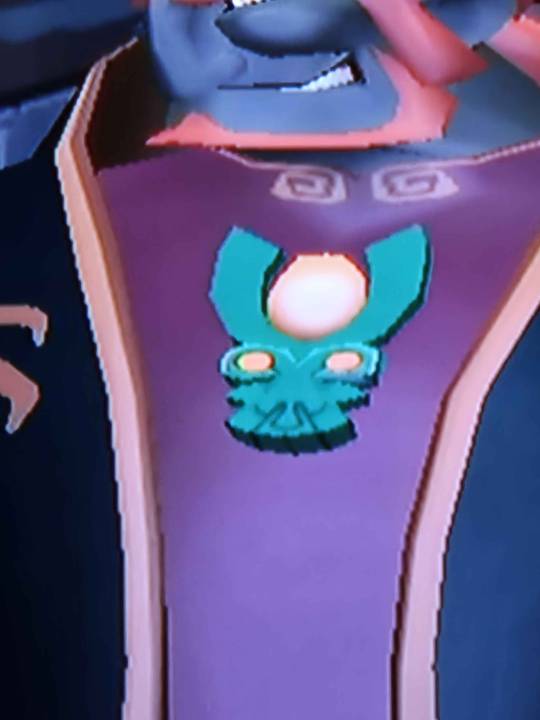
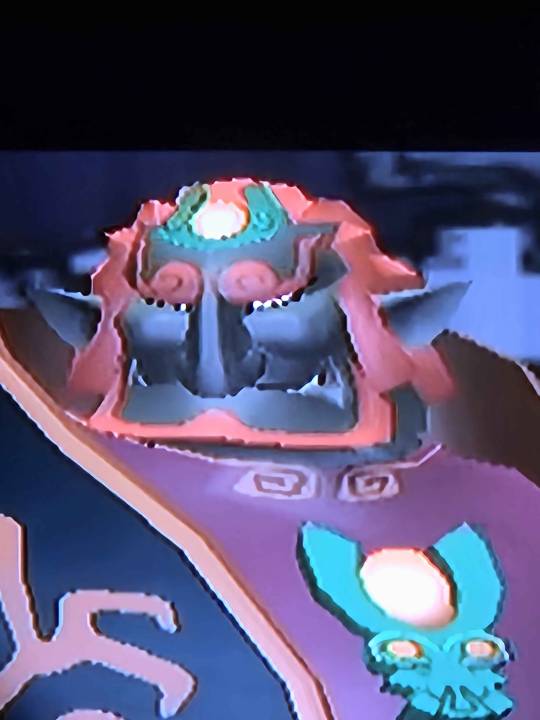
I was like: huh. That looks awful similar to Zonai Constructs. These were the closest I found but looking at it once you’re used to Zonai technology, you see the resemblance pretty clearly.
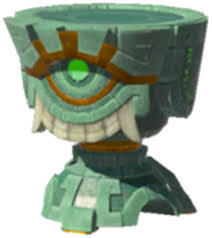
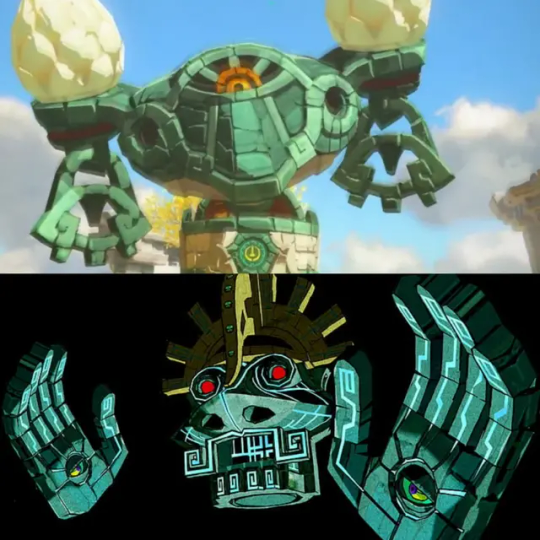
I know I’m not the first to notice the resemblance to Gohdan either, boss in the Tower of the Gods (we’ll come back to that) because this convenient picture exists.
But so what, right? It can’t be Wind Waker’s Hyrule anyway because it’s not the end of the timeline, right? WRONG. It may be the first in the adult timeline but it’s also the last in that timeline to take place in Hyrule. Phantom Hourglass takes place in the World of the Ocean King, Oshus’s dream if I remember correctly but most importantly, not Hyrule, and Spirit Tracks takes place in New Hyrule, one that Tetra and Link founded later. It is not the same land.
Ganondorf ends up dying at the end of Wind Waker with the Master Sword stabbed through his head (cough cough, we’ll come back to this too). The Triforce is used by King Daphnes, the exact words as follows:
“Gods of the Triforce! Hear that which I desire! Hope! I desire hope for these children! Give them a future! Wash away this ancient land of Hyrule! Let a ray of hope shine on the future of the world!!! And let our destinies finally be fulfilled…”
Granted this is the English translation and I don’t know Japanese, so if anyone is able to translate this scene from the original Japanese that would fly in the face of what I’m talking about please make it known.
King Daphnes wished for Hyrule to be washed away, specifically his Hyrule that he’d been clinging so desperately to. If this is indeed the same land we see from the Zonai in TotK, then the old kingdom would’ve been gone long enough to not be recognizable. He also mentions a ray of hope for the world. This is obviously referring to Tetra, Link and eventually New Hyrule but I wouldn’t put it passed the Goddesses to revive the land now that the danger is passed. And that’s another thing!
The whole reason the world flooded in the first place was because of Ganon, now that he’s died, there’s no reason for it to stay flooded. I seem to recall there being a comment somewhere in the game that went something to the effect of “there’s no fish in these waters to catch because it’s magic god water” I don’t remember where it was but do correct me if I’m wrong.
Geography was another big thing. Zelda geography has never been exactly consistent, I always assumed it was because such large chunks of time were going by that tectonic plates had shifted everything now and then. However, Wind Waker and the BotW maps are surprisingly aligned.

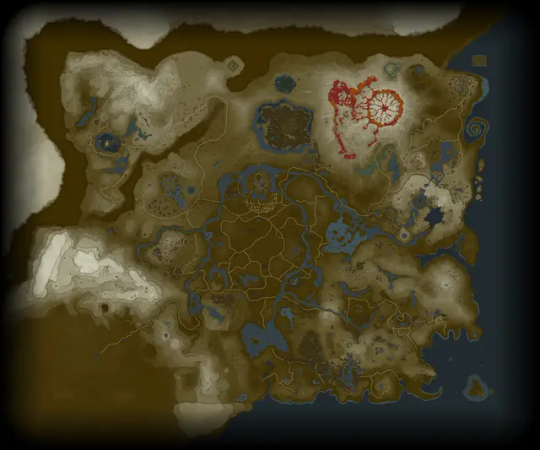
Death Mountain and Dragon Roost are easy examples, the Forest Haven is in a similar location to Mount Lanayru and is in proximity to the ice island. The Forsaken Fortress is aligned with Hebra Peak, Outset Island is shaped roughly like Spectacle Rock in the Gerudo Highlands, the Gerudo Highlands in general, and interestingly enough, Satori Mountain is very close to the Great Fish Isles. Plus there’s a lot of other miscellaneous peaks in BotW.
Something else very interesting, the final boss arena lines up rather well with being either near the castle, or perhaps the Great Plateau. A friend I was playing with when I first discovered this pointed out how proportionately small the people are, and normally you don’t notice that, it’s a very stylized game. But maybe, perhaps the reason the world feels so big was because the Hyruleans evolved to simply take up less space on the islands?
Something else interesting is Luralin Village. We’ve never really seen a fishing village before besides in Wind Waker with Outset.
To finish off the miscellaneous details I’ve noticed, the sword pose. It’s suspiciously similar to the one Rauru has Ganon in in Tears of the Kingdom. Here’s the two side by side.
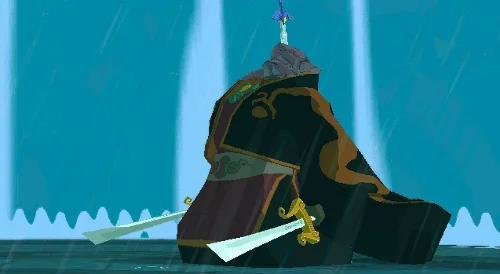
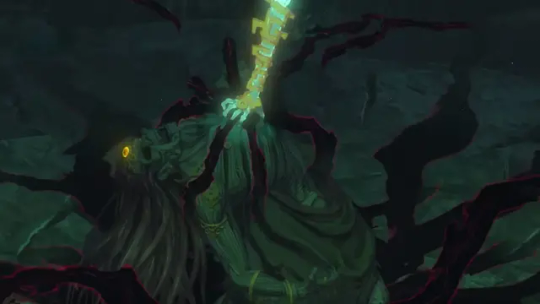
Now onto my heaviest hitters, the salt thing and the races.
As most people who’ve spent anytime debating BotW’s place in the timeline is aware, the rock salt description mentions it came from an ancient sea. This could be the Lanayru Sand Sea all the way back in Skyward Sword, in which case, why isn’t it localized to the desert area it was in? Or it’s from the Great Sea. Not much, but it’s very much suspicious.
The other big one is the Rito’s presence along with the Zora. Besides the games in question, the Rito only ever appear in the Wind Waker. We know based on the Zora iconography as well as Laruto, a Zora, being Medli’s ancestor as well as that special magic water comment from earlier I believe. So how can the Zora exist alongside them if they came from them? Answer: the Fish Map Men. They fill out your map as you travel through the islands, and on top of that, there’s a lot of Gyorgs swimming around. What is Sidon molded after again? A hammerhead shark. It’s likely a new species of Zora evolved from the sentient Fishmen, this time with more variety. The Zora monuments mentioning Ruto? Left over and well preserved under the waves, maybe like how Hyrule Castle was.
Tito weren’t the only unique race in Wind Waker, Koroks were as well. As I’m sure we’re all well aware, they are present in both BotW and TotK. They’re descended from the Kokiri, and there’s not a shred of evidence to suggest that the Kokiri ever came back. It’s likely they just stayed Koroks and since Kokiri don’t age and stay kids forever, and that trait likely carried over to the Koroks if they’re behavior is anything to go by, they just keep multiplying…
And finally, the Zonai themselves. All this started because I noticed Ganondorf was wearing what appeared to be Zonai accessories. Gohdan is said to be a trial placed by the Gods themselves. The Zonai descended from the heavens to settle Hyrule, it’s not illogical to assume that the Tower of the Gods was built at the behest of the Gods, by the Zonai. Perhaps one of Rauru’s ancestors. The Zonai also have extremely long ears, and it’s said in Ocarina of Time that Hylians have long ears so that they may hear the whispers of the gods. Wouldn’t those closer have longer ears then?
One last little thing I couldn’t seem to fit anywhere, isn’t it weird how Rauru’s name is one we recognize and yet Sonya isn’t? The Oocca canonically speak a different language than Hylians, perhaps the Zonai originally did as well and simply adopted Hyrulean names to better fit in. Rauru was arguably the most important sage. He could have chosen in to appear more humble while still showing his importance. Alternatively he didn’t want to disrespect the dead king by taking his name and/or it would seem arrogant.
#legend of zelda#loz#totk#loz totk#botw#loz botw#wind waker#loz ww#loz wind waker#zonai#totk zonai#crack theory#i genuinely went insane man#loz rauru#king rauru#rauru#zelda timeline#zelda wind waker#zelda ww#zelda totk#zelda botw
33 notes
·
View notes
Text
Anime and Manga Comparison (Encore): Amon
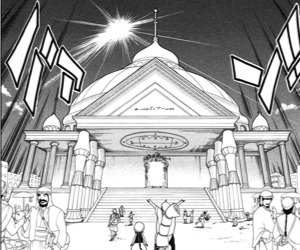
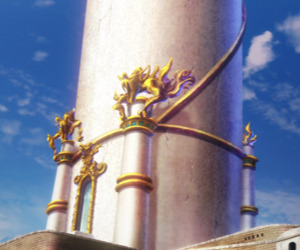
I'm back at it once more, and this time it's at the beginning. Not the very beginning, but close enough! This time comparing the first dungeon. I talked before on the specific humor compared to action we see with the slimes. Now, I want to focus on the design of the dungeon itself.
I love the intro dungeon in the manga. It's great. I do appreciate the comedic timing and framing of some Ohtaka's panels. The manga also shows Alibaba's problem-solving skills better. He has the moment in the anime showing he knows Tran and is well read and can lie pretty easily. But convincing a rich petty man that has never done anything by himself isn't saying that much.
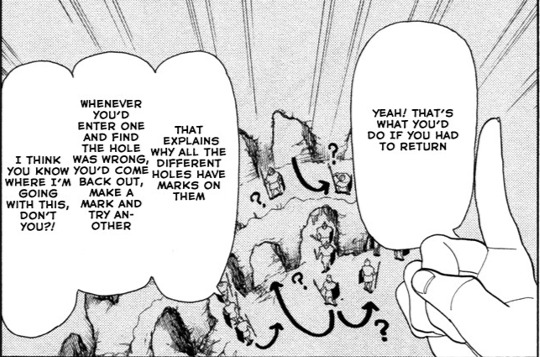
Alibaba is able to deduce the proper way to go is the path left unmarked. Not something particularly hard in retrospect. It is a common tactic to leave some kind of marker where you've been to avoid confusion He is smart to break out of the in-the-box thinking he and Aladdin were stuck in. They thought the markings were something left by the dungeon itself as clues to progress. A good ol' dungeon puzzle. It wasn't though. It was merely something left by former adventurers to not screw themselves over and get lost. Taking a minute to go "wait a sec" isn't that easy, especially in a high stake location like being stuck in a dungeon.
I love the parts in the manga that didn't make it into the anime. It is great, truly.
But goddamn is it Amon generic as fuck.
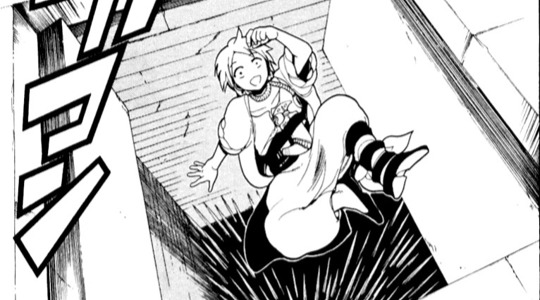
Spikes in a death pit? Ancient language that you should know or else? Bland stone corridors and caves with multiple paths you have to travel through? Slimes as the common dungeon creature?
It's so painfully generic. I can't even, lmao.
I get the impression that Ohtaka did not know what she was going for in depth with the dungeons. I don't mean that as lack of experience or planning ahead, but more-so as just wanting to get her series off the ground so she went with common tropes she knew her readers would expect and probably enjoy. A safe bet to work her story out.
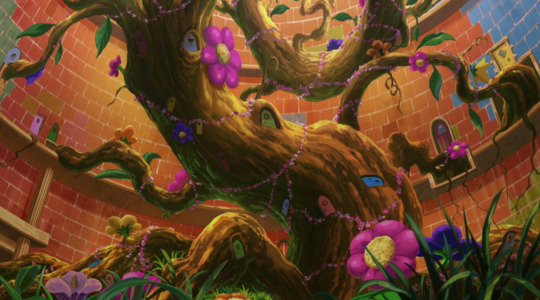
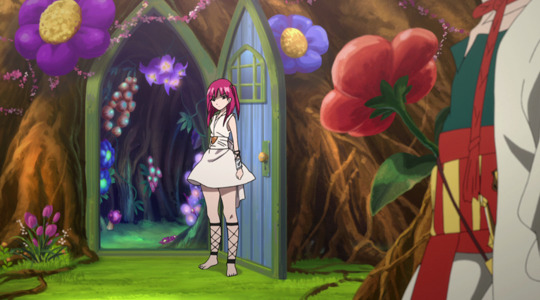
The rest of the dungeons once she gets around to them have so much character. The second you're in Zagan you can tell: this belongs to an earth djinn. Baal as the first dungeon in SnB feels more standard but has more stuff going for it. I love the creature designs inside a lot of Sin's conquered dungeons.
Belial is an absolute mindfuck and I love it so much. It's a psychological barrage of confronting your trauma and biases because Belial more than anyone else has to make sure he has a King's Candidate that has their shit together. Then it fails miserably. It has to be my favorite dungeon in the entire series.
Amon has nothing on any of that.
The anime in contrast?
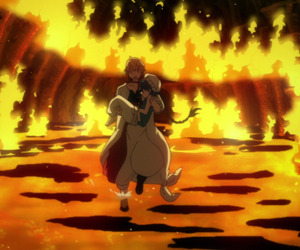
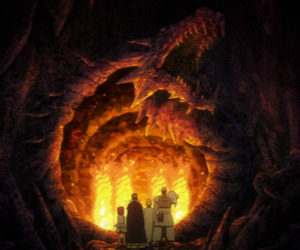
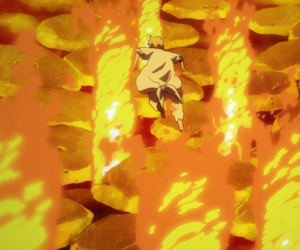
From the outset, in a way in which your ass will be fried if you don't pay attention, the lesson is clear: this belongs to a fire djinn. Be careful or you are dead. 10,000 have gone in and very few had come out. It's great. The dungeon had such a powerful glow up in the anime. 10/10 will recommend for certain death.
A couple other things that don't really fit into the theme of dungeon design. In the manga, Aladdin sits around and waits because the time dilation is different for people entering the dungeon. Something that isn't really brought up in the anime is that people travel to and from dungeons separately and at different rates. Anime Aladdin could have been there for a while. I doubt it though as kid would have drowned and been burned alive of Alibaba didn't grab him and bolt out of there.
The bigger more subtle change is how Amon is summoned.
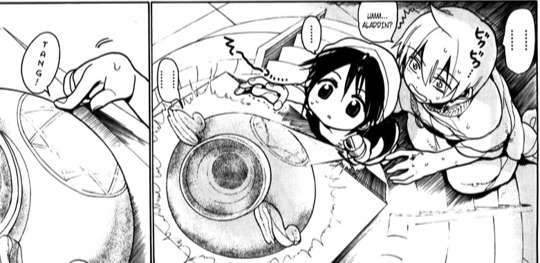
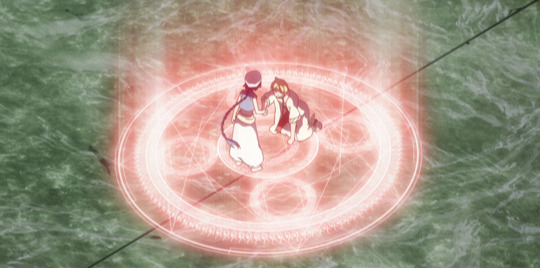
Manga: Story based on Aladdin and the Lamp. Cannot not have the imagery of Aladdin touching the lamp (or its stand-in in this case).
Anime: It's the moment when Aladdin chooses Alibaba as king. The magi has made his choice, and Amon decides that is a definitive time to come out. That isn't something that is clear on first watch. Odd that the room would suddenly light up when Aladdin helps Alibaba up. It is easy to miss the significance with not being introduced to the magi system until afterward. On rewatch it felt like a sledgehammer to me on how blatant they made it. When the anime hits you with the symbolism, it goes all out.
About wraps it up this time. Next, I'll probably try to tackle the beautiful mess that is Zagan's arc changes because BOY DO I HAVE THOUGHTS.
Mostly how it is surprisingly well done but so many people come out looking dumber in the anime. omg.
#magi#you all have no idea how much i've thought of the changes about everything#i've wanted to do a podcast for it but there's no way i have the energy to ever complete that#literally it's over twenty (admittedly handwritten) pages for just s1#magi: the labyrinth of magic#magi labyrinth of magic#magi alibaba#magi aladdin#alibaba saluja#i still have more comments on the first arc#but Zagan has SO MUCH to unpack#i'll likely end up doing that next#my stuff#long post#includes photo edit#yay going through my long backlog
33 notes
·
View notes
Text
By: Andrew Doyle
Published: Apr 18, 2024
“Why do you think the giraffe has a long neck?” says the naturalist Philip Henry Gosse to his son Edmund while he tucks him up into bed. “Does it have a long neck so that it can eat the leaves at the top of the tree? Or does it eat the leaves at the top of the tree because it has a long neck?”
“Does it matter?” says Edmund.
“A great deal, my son.”
This exchange is taken from Dennis Potter’s wonderful television play Where Adam Stood (1976), a loose adaptation of Edmund Gosse’s Father and Son (1907). Gosse’s book must rank among the very best of autobiographies. It is his account of being raised by his father Philip, one of Darwin’s close contemporaries, a man whose faith in the Bible was so fervent that the revelations of natural selection almost destroyed him.
The question about the giraffes is Potter’s invention, but it adroitly captures the profound inner struggle of this scientist who had devoted his life to a belief-system that was suddenly falling apart. It wasn’t just a matter of changing his mind as new evidence emerged, because the proposition that the earth’s age could be numbered in the billions rather than the thousands was not something that his faith could accommodate. The stumbling block was the Bible, a point that Edmund is quick to acknowledge in his book:
“My Father’s attitude towards the theory of natural selection was critical in his career, and oddly enough, it exercised an immense influence on my own experience as a child. Let it be admitted at once, mournful as the admission is, that every instinct in his intelligence went out at first to greet the new light. It had hardly done so, when a recollection of the opening chapter of Genesis checked it at the outset. He consulted with Carpenter, a great investigator, but one who was fully as incapable as himself of remodelling his ideas with regard to the old, accepted hypotheses. They both determined, on various grounds, to have nothing to do with the terrible theory, but to hold steadily to the law of the fixity of species.”
Philip Gosse had an instinct for scientific enquiry, but the new discoveries simply could not be reconciled with his holy text. His whole being was invested in the Biblical truth, and to cast that in doubt would be to undermine the crux of his being. To admit that he might have been wrong, in this particular instance, would be a form of spiritual death.
Both Gosse’s memoir and Potter’s dramatisation grapple with what Peter Boghossian and James Lindsay (in their book How to Have Impossible Conversations) call an “identity quake”, the “emotional reaction that follows from having one’s core values disrupted”. Their point is that when arguing with those who see the world in an entirely different way, we must be sensitive to the ways in which certain ideas constitute an aspect of our sense of self. In such circumstances, to dispense with a cherished viewpoint can be as traumatic as losing a limb.
The concept of identity quakes helps us to understand the extreme political tribalism of our times. It isn’t simply that the left disagrees with the right, but that to be “left-wing” has become integral to self-conceptualisation. How often have we seen “#FBPE” or “anti-Tory” in social media bios? These aren’t simply political affiliations; they are defining aspects of these people’s lives. This is also why so many online disputes seem to be untethered from reason; many are following a set of rules established by their “side”, not thinking for themselves. When it comes to fealty to the cause, truth becomes irrelevant. We are no longer dealing with disputants in an argument, but individuals who occupy entirely different epistemological frameworks.
Since the publication of the Cass Review, we have seen countless examples of this kind of phenomena. Even faced with the evidence that “gender-affirming” care is unsafe for children, those whose identity has been cultivated in the gender wars will find it almost impossible to accept the truth. Trans rights activists have insisted that “gender identity” is a reality, and their “allies” have been the most strident of all on this point. As an essentially supernatural belief, it should come as no surprise that it has been insisted on with such vigour, and that those who have attempted to challenge this view have been bullied and demonised as heretics.
Consider the reaction from Novara Media, a left-wing independent media company, which once published some tips on how to deceive a doctor into prescribing cross-sex hormones. Novara has claimed that “within hours of publication” the Cass Review had been “torn to shreds”. Like all ideologues, they are invested in a creed, and it just so happens that the conviction that “gender identity” is innate and fixed (and simultaneously infinitely fluid) has become a firm dogma of the identity-obsessed intersectional cult.
Identity quakes will be all the more seismic within a movement whose members have elevated “identity” itself to hallowed status. When tax expert Maya Forstater sued her former employers for discrimination due to her gender-critical beliefs in 2019, one of the company’s representatives, Luke Easley, made a revealing declaration during the hearing. “Identity is reality,” he said, “without identity there’s just a corpse”.
This sentiment encapsulates the kind of magical thinking that lies at the core of the creed. So while it becomes increasingly obvious that gender identity ideology is a reactionary force that represents a direct threat to the rights of women and gay people, there will be many who simply will not be able to admit it. In Easley’s terms, if their entire identity is based on a lie, only “a corpse” remains. From this perspective, to abandon one’s worldview is tantamount to suicide.
This determination to hold fast to one’s views, even when the evidence mounts up against them, is known as “belief perseverance”. It is a natural form of psychological self-defence. After all, there is a lot at stake for those who have supported and enabled the Tavistock Clinic and groups like Mermaids and Stonewall. Many of the cheerleaders have encouraged the transitioning of children, sometimes their own. What we have known for years has now been confirmed: many of these young people will have been autistic, or will have simply grown up to be gay. For people to admit that they supported the sterilisation of some of the most vulnerable in society would be to face a terrible reality.
This idea was summarised in parliament on Monday by Victoria Atkins, Secretary of State for Health and Social Care. Addressing Labour MP Wes Streeting, she said:
“I welcome all those who have changed their minds about this critical issue. In order to move forward and get on with the vital work that Dr Cass recommends, we need more people to face up to the truth, no matter how uncomfortable that makes them feel. I hope the honourable gentleman has the humility to understand that the ideology that he and his colleagues espoused was part of the problem. He talked about the culture and the toxicity of the debate. Does he understand the hurt that he caused to people when he told them to ‘just get over it’? Does he know that when he and his friends on the left spent the last decade crying ‘culture wars’ when legitimate concerns were raised created an atmosphere of intimidation, with the impact on the workforce that he rightly described?”
youtube
It remains to be seen whether those politicians who failed to grapple with the implications of gender identity ideology, and who mindlessly accepted the misleading rhetoric of Stonewall and its allies, will have the humility to admit that they were wrong. Many culpable celebrities have been choosing to remain silent in recent days, while others have opted for outright denial. On the question of puberty blockers and their harm to children, television presenter Kirstie Allsop has made the remarkable claim that “it is, and always has been possible to debate these things and those saying there was no debate are wrong”. The concept of “no debate” was official Stonewall policy for many years, and has been a mantra for many within the trans activist movement. To suggest that there have been no attempts to stifle discussion on this subject can only be ignorance, mendacity or a remarkably acute form of amnesia.
Of course, the stakes could hardly be higher. We are dealing with complacency and ideological capture that had resulted in the sterilisation and castration of healthy young people. It is, without a doubt, one of the biggest medical scandals of our time. It is entirely understandable that those who have supported such terrible actions would enter a state of denial. And so we must also be sensitive to those who are now strong enough to admit that they were mistaken.
But we also need to prepare ourselves for the inevitable doubling down. There are those whose psyche cannot withstand the kind of identity quake that Philip Henry Gosse once suffered. His solution was to write a book explaining why God had left evidence of natural selection. It was called Omphalos (1857) – the Greek word for “navel” – and his thesis was that since Adam had no mother, his navel was merely an addition to generate the illusion of past that did not exist. The fossils that were being discovered in the ground were therefore no different than the rings in the first trees in the Garden of Eden. They weren’t evidence of age, but rather part of God’s poetical vision.
Some of the revisionism and excuses from gender ideologues are likely to be even more elaborate. They have invested too much in their fantasies to give up without a fight.
==
As gender identity ideology falls apart, we need to pay attention to who is working to fix the mistakes they made, who is doubling down, and who is remaining silent.
#Andrew Doyle#revisionism#gender ideology#gender identity ideology#queer theory#Cass report#Cass review#intersectional feminism#gender cult#medical scandal#medical mutilation#medical corruption#ideological capture#ideological corruption#religion is a mental illness
40 notes
·
View notes
Text
TIGER HRT CHAPTER 2 - MONTH 0 - EXPECTATIONS
First/Prev - Next
---
It's been six months. Six months since that weird doctor and his inane little test to prove I'm ready, or at least, ready enough. Six months since I signed a stack of liability waivers forfeiting my right to pursue legal action for any reason up to and including untimely death. Only DAYS left before I can finally claim the entire reason I was there in the first place.
I came home today to find an information package in the mail - things I need to know before making my final commitment to the treatment. It's somewhat reassuring, really. By the sounds of it, this guy has to deal with all kinds of odd requests - I heard a rumour that someone went to him for a chimera treatment at one point - which means that he has to do all this research into side effects personally. …Although there's no telling how much of this is speculation. Concerning.
The information package is divided into different headings, roughly organized by risk factor and how outwardly noticeable they are, as if he's right here with me, trying to scare me off from it.
I decided before I even went to him that I wasn't going to let myself be scared again. Let's see what I'm in for. I sit down and start reading…
SKELETAL STRUCTURE
"Subject's height will noticeably increase. Increase of six inches is expected, increase of one foot is possible."
Huh. I guess I wouldn't mind being taller, but that's definitely going to affect what kinds of clothes I can wear. And I guess I might also get a bit wider proportionally? I'm already plus-size, maybe it'll just level it out.
"Subject may experience a conversion from plantigrade (walking on soles) to digitigrade (walking on toes)."
That makes me stop and think. I'd basically have to re-learn how to walk, and no doubt there's going to be an awkward intermediate period. Will my feet get bigger as well? They're big enough to make me dysphoric as it is. I wonder if I can get custom footwear made… I wonder how much that will cost…
"Subject will experience a reconfiguration of fingers to allow for retractable claws. Persistent soreness is to be expected."
Bluh. I've bitten my nails too close enough times to know how much it sucks not to be able to put pressure on my fingers without pain. I wonder how long that particular effect will last. Due to the lack of timeframe, I can only guess. Months, maybe. Years, I doubt it, but possibly.
"Subject's cranial and facial structure will experience long-term reformation. The effect this will have on brain function is unknown.
And here we get into "you signed a waiver" territory. I had accepted at the outset that death was a possibility, but I'm not sure how to feel about the risk of permanent brain damage. None of the other accounts of therian HRT I've heard seem to mention this, though, so maybe it's just speculation? I move on to the next heading.
DIET
"Tigers, like all felines, are obligate carnivores. Subject will be required to eat real meat (no substitutions) at every meal, or risk symptoms of starvation."
This had already occurred to me, to be honest. Part of the reason a white tiger is my fursona in the first place is because I am an unrepentant meat enjoyer. Heck, maybe a feline body will make meat taste even better.
"Lingering human characteristics may make it possible to digest other food, but the nutritional benefit to subject will be negligible."
…Ah. This was less expected. Does this mean I'll have to start thinking of things like bread and fruit as basically candy? Worse, will I have to avoid it? I love me a good grilled cheese, and poutine is basically an addictive substance, am I going to have to swear off some of my longtime favourites? Out of all of the effects so far, this is the one to give me the most hesitation. Yes, I love food, I'm not afraid to admit it.
"Subject is likely to lose cravings for non-meat food entirely."
I have to sit back and process this one. Back when I started human HRT, one of the things that gave me pause was the idea of decreased libido. That was one of the few things about my body that didn't make me dysphoric, unlike a lot of trans people whose stories I'd read. In the first few months, though, I found it settled into a pleasant sort of medium, where I could have it if I wanted, but it wouldn't show up out of nowhere. Maybe this will be the same way? Maybe poutine can still be a sometimes food? Cats eat weird stuff that's not healthy for them sometimes, but it's fine, right?
Some part of me considers holding a funeral for the abstract concept of poutine.
On to the final heading…
SENSORY EFFECTS
"Subject will gain heightened night vision and hearing. This will cause sleep to become significantly more difficult."
Trust a doctor to find the one downside to one of the coolest effects of the treatment… Do you even know how much I want to hear every beat of the world around me? Do you even understand how useful it would be to be able to see in the dark effortlessly? Having a tiger's eyes and ears would be almost worth every single downside by itself.
Besides, I'm a very heavy sleeper.
"Subject's hearing frequency range will become significantly more broad than a human's. High-pitched noises such as dog whistles will be audible and painful."
Well, I'm sure that's going to suck sometimes, but I don't think I'm exposed to such noises on the regular. Although… I suppose I wouldn't know, with my feeble human frequency range. It's something that might be fine or might suck, I guess.
"Subject's sense of touch will be strongly affected by fur growth."
Sure, that tracks, but I'm kind of looking forward to it. Maybe it's comparable to wearing a full-body fursuit? I've actually missed having opportunities to fullsuit, and I've thought about commissioning a new one if I saved up enough money, but I suppose that won't be necessary now.
Much of the rest of the document is a reminder that everything listed is Permanent and Irreversible short of Major Surgery, with some reminders of the various rights to litigate that I've waived. Ultimately, it sounds like I've got some big changes ahead, but nothing I've seen here is a dealbreaker.
It's slightly terrifying, but I'm excited.
I can't wait to hear the rain through a tiger's ears.
36 notes
·
View notes
Note
Self-rec time! What are your favorite five fics that you've written and why? After replying to this ask, feel free pass on to five other writers to spread the love. 💗
Hi, thank you for the ask 💗 It's difficult to pick, not because I think all of my fics are amazing, but because writing takes a lot of effort so I only make time to write the ideas that I love. Right now, as a survival technique, my favorite fics are my three WIPs (one in each of my fandoms).
Focusing on my completed fics, in descending order:
5 -- In Your Image (Harry Potter, Tomarry):
It's rare for me to finish writing a fic and look back upon it with the feeling that I accomplished everything I intended from the outset. This is one of the exceptions. Aside from phrasing and word choices that can always be improved, I am satisfied with my Tomarry take on The Picture of Dorian Gray, and I'm especially proud of the climax and ending.
4 -- Inventing Paradoxes (Harry Potter, Tomarry)
This is a sentimental favorite. I came back to the Harry Potter fandom during the pandemic as a coping mechanism, so I wanted to write something lighthearted and happy (though one could argue I should've picked a different ship). With the Paradoxes series, I regained confidence in writing, a skill that had grown rusty, and I also got a lot of support from my readers, which made me feel like part of a community during a difficult period.
3 -- Perhaps Love (Digimon, Takari)
Another sentimental favorite: I first started planning / writing this fic when I was a teenager, upset with the non-canonical ending to my first ship. The heydays of the fandom have long past by the time I posted, but I was able to find readers who felt similarly disappointed and appreciated the ending that I provided. As with many of my stories, Perhaps was written around three pivotal scenes, and when I reread them years later, I can still appreciate the emotional impact that I was aiming for.
2 -- (never) let me go (Harry Potter, Tomarry)
I've always been and am still fascinated by the concept of death. As a teenager, I wanted to write a story where Harry struggles with the concept of immortality as the Master of Death because it means leaving his loved ones behind, but I didn't have the life experience to pull the story together. After discovering Tomarry, I reframed my original idea into a story about the acceptance of death: both from Harry, who doesn't want to lose someone he loves, and from Tom, who's afraid of moving on.
It's sort of a strange story, and I still find things I'd like to improve when I reread it. However, I was happy that it found readers who enjoyed its strangeness and super flattered that it was bound into a little book!
1 -- Once Upon a Fairy Tale (Digimon, Takari)
Like In Your Image, this is one of the few stories where I feel that I satisfactorily translated my complete vision to paper (and more). I enjoyed exploring how two characters can fall in love and yet still not be together, a theme that I revisit in other works, whether consciously or subconsciously. And when I reread the story, I can discern the hopes and dreams of a person who has yet to experience the ups and downs of real life, which fills me with bittersweet nostalgia for the innocence I once had.
Thanks for reading my rambling!
I'll tag @moonytear, @isalisewrites, and @kippipies (but no pressure at all!).
22 notes
·
View notes
Text
The Dance of the Dragons: A Military Analysis (Pt. 1)
I’ve been meaning to do this since I watched House of the Dragon and read Fire & Blood; after reading and re-reading F&B, I’ve concluded that the way that the Dance of the Dragons was fought by both factions is plain nonsensical. I will demonstrate this by analyzing the military as well as political aspects of George’s narrative, referring to F&B and other works in George’s ASOIAF legendarium and analysis I’ve seen from reddit and Tumblr. Part 1 covers Chapters 1 and 2 of The Dying of the Dragons, being The Blacks and the Greens and A Son for A Son, as well as The Red Dragon and the Gold where it concerns the alignment of the houses.
Starting with Gyldan’s claim that the realm was ‘divided in two’ by the Dance, this is provably false even if one takes it as just a shorthand phrase and not a serious attempt at summarizing the Dance for his audience. Rhaenyra received the nigh uncontested support of four of the Seven Kingdoms during the war, the North, the Riverlands, the Iron Islands and the Vale, whereas Aegon II’s claim went uncontested only in the Westerlands and Stormlands. The Crownlands and Reach were divided from the outset, with the Tyrells remaining neutral until the end (arguably, but we’ll save that for later). Taking into account the Royal Fleet and Rhaenyra’s numerical advantage in Dragons, even though Rhaenyra’s allies were not all able to provide immediate support, the sheer number of her supporters presents a problem with George’s set-up.
What is that problem? By George’s premises that he established in his work, Rhaenyra’s support should not exist or at least not without the lack of qualification he provides. The chapter Heirs of the Dragon - A Question of Succession states that the Council of 101 AC chose Viserys over Rhaenys’ son Laenor by a wide margin, possibly as much as 20-to-1. Though she was passed over as Jaehaerys’ heir in 92 AC for her uncle Baelon, Rhaenys’ claim for her son was superior to that of Viserys, as she was the eldest child of the first son of the King while Viserys was the second son’s eldest. Yet George would have us believe that after passing over Rhaenys’ superior claim under Andal Law, the lords of the realm would support Rhaenyra in droves despite her objectively inferior claim? The oaths sworn to Rhaenyra as Viserys’ heir were made when Daemon was removed from the line of succession, and because Viserys had no children save for Rhaenyra. By Viserys’ death he has three sons and his eldest, Aegon, was in a similar situation to Rhaenys and Laenor. Under Andal Law, a sister cannot inherit before a brother; but just like in 101 AC, the wishes of the King that the legal heir not inherit were given preference over the law. There should be plenty of lords and ladies from either side of the 101 AC debates that would support Aegon on the basis of his sex or his legal status, but save for House Baratheon it seems that none of the houses that supported Rhaenys received offers of alliance from Otto and the Green Council until after Blood and Cheese, if at all.
George does not help his case by giving us so few good reasons as to why certain houses supported Rhaenyra or Aegon; @lemonhemlock has an entire tag devoted to this issue, and I recommend starting with this thread. Despite Aegon II’s ties to the Reach via the Hightowers and the potential for this to increase the Reach’s influence over the realm, the number of houses listed as joining the Blacks far outnumbers the Greens. House Beesbury, Merryweather and Caswell may be explained by Aegon executing members of those families for supporting Rhaenyra, but we get no reasoning for the Tarlys, Mullendores, Grimms, Rowans, Oakhearts, Footlys or Costaynes. On the opposite end of the spectrum are the Westerlands and Stormlands, which supported Aegon II without any mention of internal opposition by Gyldan. This is especially bizarre for the Stormlands given that Otto Hightower expected House Tarth to support Rhaenyra, while Lady Fell and Lord Buckler were among those executed by Aegon II early in the war. This trend of inexplicable unanimity continues with the Riverlands, whose lords are called a ‘notoriously quarrelsome lot’ but support Rhaenyra completely with the exception of the Brackens and the Vances of Atranta. The only real basis for this support that we get from the narrative rests upon the oaths made to Rhaenyra in 106 AC and a single visit she made to Riverrun in 112 AC, decades before the war began.
The unanimity of Northern support for Rhaenyra is even more questionable based on information which George provides within Fire & Blood and elsewhere. Despite Rickon Stark’s death in 121 AC, his son Cregan Stark only became Lord of Winterfell in 126 AC after imprisoning his uncle Bennard Stark and his sons for being slow to relinquish their authority as regents. Despite the approach of winter and the conflict with his uncle, we hear nothing of any misgivings or opposition to Cregan’s pact with Jacaerys. The pact itself is remarkably generous to Rhaenyra, guaranteeing the North’s support in exchange for the marriage of Cregan’s son to a future daughter of the still unwed Jacaerys Velaryon (contrast this with Hoster Tully’s demanding that Ned Stark wed & bed Catelyn during Robert’s Rebellion). In the case of Jeyne Arryn’s support for Rhaenyra, her supporters in House Royce have every reason to oppose this given that Rhaenyra’s consort is Daemon Targaryen, the man who allegedly had Rhea Royce murdered and tried to claim Runestone. Yet they seem not to oppose Lady Arryn’s decision, and Ser Willam Royce is among Rhaenyra’s supporters during the King’s Landing riots. When the war is over and Jeyne Arryn dies, House Royce promptly makes an about-face to support Arnold Arryn over Jeyne’s named heir Joffrey. Finally there’s the “Silent Five,” Corlys Velaryon’s nephews who lost their tongues for accusing Lucerys and his brothers of being bastards. We are told in Under the Regents - The Hooded Hand that the Five supported Aegon and that three died during the war, yet we do not hear of Velaryon forces of any kind supporting the Greens in the Dance’s narrative until after Rhaenyra imprisons Corlys.
The Dance’s narrative makes even less sense when it comes to the Tyrells and Tullys, both of whom are neutral for most of the conflict. The Tyrells initially declare for Aegon but opt for neutrality when confronted with the large number of Black supporters in the Reach. The Tyrells remain neutral even after these Black houses are brought to heel by Ormund Hightower and Daeron Targaryen, but according to Maester Munkun they prevented the Hightowers from aiding Aegon II at the end by threatening the life of Garmund Hightower (fostering at Highgarden as a ward). The Tyrells were apparently unmoved by Aegon II’s rising fortunes, but were prepared to violate guest right and murder a child for the prospect of Aegon III becoming king.
Meanwhile Elmo Tully keeps his house out of the war despite the protestations of his grandfather Grover, who is bed-ridden but wishes to support Aegon II. Elmo wished to avoid his house being assailed by either faction’s dragons, but he breaks neutrality and declares for Rhaenyra after being visited by Addam Velaryon with Seasmoke. While Elmo is claimed to have said “a dragon in one’s courtyard does wonders to resolve one’s doubts,” this quote makes House Tully’s prior neutrality even more mystifying. Daemon and Aemond were both present in the Riverlands and rode dragons far fiercer than Seasmoke, but we’re to believe that neither of them considered a show of force as a means of winning over House Tully? Elmo’s decision also makes little sense in light of the fact that Rhaenyra’s cause is in shambles at this point in the Dance, with Borros Baratheon and Ormund Hightower closing in from the south, the people of King’s Landing rioting against her, her Velaryon supporters abandoning her en masse due to the imprisonment of Lord Corlys, and rumors circulating that she had Queen Helaena and Dowager Queen Alicent gang-raped in a Flea Bottom whore-house. That George chose this moment for the Tullys to intervene on Rhaenyra’s behalf is bizarre, especially given the devastation wrought upon the Riverlands by the Dance.
I’ve doubtless left out other examples of inconsistencies and contradictions within the political alliances of George’s narrative, but in the interest of keeping things brief I’ve focused on what I found were the most obvious. If you’ve made it this far without drowning in walls of text, I commend you and thank you for your time (I definitely intend to add more images to spice things up).
If you’ve got feedback for me, the replies and my inbox are open!
#house of the dragon#hotd#team green#team black#grrm critical#fire and blood critical#asoiaf critical#asoiaf
208 notes
·
View notes